You're currently viewing a custom sorting.

Star Trek Ent - 1x15 - Shadows of P'Jem
Originally Aired: 2002-2-6
Synopsis:
When T'Pol is ordered by her superiors to leave Enterprise, she goes on one last away mission with Archer to planet Coridan, where they are taken captive by a militant faction and once again encounter the volatile Andorians. [DVD]
Problems
None
Factoids
- This episode establishes that there are 15 phase pistols aboard Enterprise.
Remarkable Scenes
- Archer teasing Trip about not going to Coridan.
- T'Pol passing Archer off as a steward.
- Shran declaring that he can't sleep at night knowing he still owes Archer for what he did for him.
My Review
This is a somewhat odd episode. Not only did the characters have to deal with the hostage situation on Coridan (a nice reference to TOS: Journey to Babel), but they also had to deal with the repercussions of the destruction of the P'Jem monetary due to the events of Ent: The Andorian Incident. Both situations seem to come to a head simultaneously. Unfortunately the two plots don't mingle very well. The primary plot seemed to be the hostage situation while the secondary plot seemed to be the aftermath of P'Jem when it should have been the opposite. Seems the writers couldn't make an interesting story out of just the aftermath, so they conjured up a reason for some generic action. The result is a kind of mash up that makes for a rather mediocre episode.

Star Trek Ent - 1x18 - Rogue Planet
Originally Aired: 2002-3-20
Synopsis:
While exploring an uncharted planet, Enterprise crew members encounter a group of aliens who are hunting down indigenous creatures for recreation. [DVD]
Problems
None
Factoids
- Hunting went out of style on Earth over 100 years ago according to Archer.
Remarkable Scenes
- Archer: "Do Vulcan captains have their portraits hanging at the high command?" T'Pol: "Vulcans are revered for their accomplishments, not for the way they look." Tucker: "Except for the really important ones who get mummified."
- Reed: "Follow me." Archer: "Why don't you let me play captain for a while, Malcolm?"
- T'Pol to Archer: "With respect, captain, I wonder if you would be so determined to find this apparition if it were a scantily clad man?"
My Review
A painfully slow plot. This episode has the honor of being the first Star Trek episode I've ever fallen asleep to during my first viewing. It probably has a lot to do with the fact that the setting is so dark and that very little actually happens. I was also disappointed that this episode was so much of a rehash. We've seen too many shape shifters before. Hell, we've even seen shape shifters living on a rogue planet before, when Sisko first visited the Founders' homeworld! We've also been told in DS9: Treachery, Faith, and the Great River that the Founders were hunted. So, let's recap. Founders: 1. live on a rogue planet, 2. are shape shifters, 3. are hunted. The aliens of this episode: 1. live on a rogue planet, 2. are shape shifters, 3. are hunted. Throw in the fact that the hunters in this episode have a similar moral structure to the Hirogen, and the rehash-o-meter starts going through the roof! Ranting of rehashes aside, I thought the episode was morally correct. I found the whole hunt as distasteful as the crew of Enterprise and I was glad they found a way to sabotage the hunt without actually attacking the hunters directly. It was a clever solution.
The following are comments submitted by my readers.
- From Zorak on 2016-09-22 at 10:31pm:
I have to disagree about the morality of Archers actions. First off, the hunters were very good to them and Archer could have easily gotten them killed with his actions. Second, he never even tried to reason with the hunters or explain his position. He just up and decided these people and their cultural practices are evil and wrong and going behind their backs and sabotaging them was the only answer.
Sloppy writing and another poorly done morality play in my opinion.

Star Trek Ent - 1x19 - Acquisition
Originally Aired: 2002-3-27
Synopsis:
When the Ferengi, a group of intergalactic thieves, stun the Enterprise crew and try to rob the ship, it's up to Trip to work covertly to stop them. [DVD]
Problems
- The whole premise is a rather annoying continuity problem. See comments.
Factoids
- There are only 172 rules of acquisition at this time.
- Jeffrey Combs (Weyoun, Brunt, Shran) and Ethan Phillips (Neelix) play Ferengi characters in this episode.
Remarkable Scenes
- Archer getting beat up by the Ferengi...
- Archer regarding Vulcans: "They're really not all that interesting once you get to know them."
- Archer: "Trust me, she's got no sense of humor, she's always complaining..."
- T'Pol: "There are times I wish Vulcans hadn't learned to repress their violent tendencies."
- The Ferengi pulling a gun on the the retractable medical scanner bed as it approached him.
- The Ferengi talking to Porthos.
- Trip being hit by a Ferengi whip. Nice reference to TNG: The Last Outpost.
- Archer and Trip putting on a shwo for the Ferengi.
- T'Pol picking on Archer for the things he said about her to the Ferengi.
- Rules of Acquisition; 6. Never allow family to stand in the way of profit. 23. Nothing is more important than your health, except for your money. 45. Expand or die. ?. A man is only worth the sum of his possessions.
My Review
I suppose it was only a matter of time before something like this had to happen. Well, I'm not going to rant about how this episode tramples all over continuity like a fanatic at a convention, because with some rationalization it's not so bad. With some more careful writing, it could have even been a great episode. I liked the detail showing the Ferengi whip, and I liked how Archer seems to have scared them all the way back to their homeworld. Knowing the Ferengi, who are driven by fear more than other species, they probably avoided Earth's corner of the galaxy for a long time and once the Federation was formed they probably avoided that too until contact became absolutely necessary in TNG: The Last Outpost. That said, I'm not happy that the writers decided the Ferengi needed a cameo and that they did it in such a careless manner. In order to rationalize this episode, we're forced to believe that these Ferengi were a very long way away from home and that records concerning this incident were not kept in very good detail. Both are distinct possibilities, so I'm just going to leave it at that. Continuity does suffer because of this episode though, and I've forced to mark it down thusly. When you stop caring about such things though and watch the episode for its raw merits, what you find is that its marvelously hilarious. Watch this episode to find the basis for Quark's future "Vulcan Love Slave" holosuite program. ;)
The following are comments submitted by my readers.
- From Pete Miller on 2006-12-10 at 6:38am:
As with many Enterprise episodes, you kind of have to ignore the continuity errors. After all, it is Brannon Braga's show. I find that when you dismiss the Ferengi first contact stuff, this episode becomes quite enjoyable. The humor is priceless, and I like how the Ferengi here are much more like the Ferengi we see in TNG rather than DS9.
Also, I really like Jeffrey Combs and Ethan Phillips in this one. - From JRPoole on 2011-07-21 at 11:35pm:
I agree with the sentiment here. Not a bad episode if you take it with a grain of salt. One thing that DS9 (still probably my favorite Trek overall though it got kind of religiousy after Roddenberry died) got so right was what it did with the Ferengi. They were so well used as fodder for satire in so many solid humor episodes even if you have to overlook a few really bad outings.
The problem with TNG-style Ferengi is that, much like the ones here, they seem so much of a self-parody that it's hard to believe they're really capable of space flight and pose any threat at all. At least these are a little sharper than the hissing, growling, whip cracking Ferengi we see early on on in TNG. - From Josh on 2011-10-08 at 1:08am:
This has pretty much everything you need in a light-hearted episode: lots of humour, my two favourite ST supporting actors, and a solid 20 minutes of Trip running around in his underwear.
Usually Ferengi in large numbers annoy me, but its hard not to like Jeffrey Combs and Ethan Phelps. Besides Clint Howard, who was the other Ferengi played by?
One thing I wasn't sure about; I thought gold didn't hold much value to Ferengi? I could swear I remember Quark saying something to that effect... - From Dstyle on 2015-09-03 at 1:09pm:
Hey, did any of y'all notice that T'Pol is a very attractive woman? Don't worry if you didn't: the writers will make sure to repeatedly draw your attention to it episode after episode.

Star Trek Ent - 2x06 - Marauders
Originally Aired: 2002-10-30
Synopsis:
In need of fuel, Enterprise discovers a mining colony that is being controlled by Klingons who are bullying the inhabitants and hoarding their supplies. [DVD]
Problems
- Like Voy: Demon, the writers apparently don't know what deuterium is. It's a type of hydrogen. It can be extracted from anything, including from water! It's hardly a valuable commodity. There's no need to "mine" it. Again, the writers are confusing deuterium with dilithium.
Factoids
None
Remarkable Scenes
- Archer: "There's a saying on my world. Give a man a fish and he eats for a day. Teach a man to fish and he eats for a lifetime."
- Hoshi demonstrating how to hit a target. Oh the irony! ;)
- T'Pol: "Try to strike me." Travis hesitates. T'Pol: "You won't hurt me." Travis: "It's not you I'm worried about."
- Archer recalling the events of Broken Bow to encourage confidence in Tessic.
- The victory against the Klingons.
My Review
This is a decent episode, but it drowns under the weight of that rather nasty technical problem regarding how the authors don't have the slightest clue what deuterium is and some mildly poor writing. The technical problem is documented in the problems section, so I won't get into that. The Klingons are shown rather out of character here. They put up an amazingly weak fight. They fall for simple tricks and when told to leave and never come back, that's exactly what they do. This logical problem could have been solved if the Enterprise crewmembers taught the colonists more sophisticated ways to defend themselves, but it seems the writers have just as much a taste for guerrilla warfare as they do for misusing the term deuterium. ;) On the other hand, this episode contributes positively to continuity. Repeated incidents like this one could very easily get the Klingons pissed off enough at Earth to start a war. So it's a mixed bag. Not all that great, but not all that bad either.
The following are comments submitted by my readers.
- From Tallifer on 2011-05-13 at 11:14pm:
The climactic fight was horrible. These were fully armed Klingons and yet no one died: not much of a lesson for the Klingons. (Perhaps T'pol wisely advised them that killing any Klingons would only instigate a bloood fued, but I never saw that mentioned.) - From belvedere_hedon on 2012-08-17 at 8:51pm:
Deuterium is a form of hydrogen, but it cannot be separated chemically and (at least on earth) it is found in very low concentrations in naturally occurring hydrogen sources (i.e. water). Purifying deuterium is energy intensive with modern technology, and it is not unreasonable to assume that refining it would be a self-sustaining service as it would provide a fuel for fusion reactors in a remote part of the galaxy. Indeed, much of our justification for establishing permanent presence on the moon is that it would provide a valuable source of deuterium to fuel space exploration since the natural concentrations are higher there, and the lower gravity makes sending it into orbit cheaper. - From Roger on 2015-05-22 at 12:13pm:
Was this the first episode that established that Klingons have transporter technology? The Klingons were mischaracterized as utter wimps. And why didn't they just beam back down behind Archer and Company at the end and open fire? Or just drop a photon torpedo on the camp before they departed! Instead of just leaving with their tails between their legs.
This episode was like "Magnificent 7" in outer space. Not that that in itself was bad, but the writing was really poor, in that they couldn't find a better way to defeat the Klingons that didn't make the Klingons look like utter wimps.
And as already noted, the fight scene was not credible. Very bad shooting, even after practicing - I thought I was watching an old "A-Team" episode! And T'Pol as Rambo wasn't idiotic - why fight hand to hand when you have phase pistols, presumably with a stun setting? I find politically correct Trek to be very annoying...
One of the hallmarks of good Trek is believeability. There is not much to be found in this episode, including the deuterium mining issue. The premise was good, but bad writing killed it. I'll be generous and give it a 2. - From Dstyle on 2015-09-09 at 3:00pm:
As I've been reading the comments on these second generation Star Trek reviews, I regularly see someone (or a few someones) complain about "politically correct" Trek, and I'm always left wondering what the hell they're talking about. The original 1960s Star Trek, with their pluralistic, multi-cultural crew (including a real live woman! On the bridge! With her lady parts and everything!) was pretty damn "politically correct" for it's time. In this instance, Roger is upset because a lady is doing martial arts, I guess because ladies doing anything besides being quiet, demure, and obedient is some sort of betrayal of Star Trek core principles. Let me reiterate this point, because it really boggles my mind: commenters like Roger consider T'Pol (T'POL!) to be "politically correct" and problematic. Well, don't worry, Roger, the show still objectifies the hell out of her! She's basically T and A that sometimes talks! The fragile masculinity of your like-minded male Star Trek fans is in no danger of being threatened, trust me!
It was particularly interesting to me to see that comment by Roger on this episode, because as I watched the episode I was thinking about how Star Trek consistently casts almost exclusively white actors in supporting roles. Any time they encounter an alien species, they're almost always white people with some sort of forehead prosthetics. The implication is that "white" is a default race and that any other race, alien or human, is just a variation of whiteness. Even the Klingon captain in this episode--the only Klingon with any significant lines, mind you--is played by white actor Roberson Dean! As with any science fiction series (or any show, for that matter, but it especially holds true for science fiction), you can learn a lot about the contemporary culture and climate by paying attention to things like this, and as such the various second generation Star Trek series reflect the racial milieu of 90s and 00s America. It's interesting to see, and, in my opinion, Star Trek is getting increasingly less progressive as the series of shows run their course, largely because they're being less intentional about their representations of these kinds of issues. - From Zorak on 2016-09-29 at 12:16am:
This was by far and away my least favorite episode of Enterprise so far. I don't even want to get into the specifics. This is the writers telling us, the audience, that they have no respect for our intelligence. Utterly predictable down to no one getting hurt (including Klingons), the "Home Alone" style tactics, and the Klingons deciding they would never be back. So completely cliché and predictable that I knew exactly how the rest of the episode would play out within the first 10 minutes. They should be ashamed to have made this. - From Hugo on 2017-09-14 at 5:15am:
Reasonably entertaining, but what stops the Klingons from a) just shooting at the camp from space, or b) come back with reinforcements? - From President Obummer on 2020-01-21 at 10:58am:
Terrible episode, two big problems aside from all the deuterium science:
1. The miners would not have just let these murderers go, 5 (plus 3 in battle) of their friends and family were massacred, nobody seems to care?
2. Klingons live for battle, the miners putting up a fight would give them more incentive to come back.
Just terrible...

Star Trek Ent - 2x08 - The Communicator
Originally Aired: 2002-11-13
Synopsis:
Reed and Archer retrieve a communicator left behind on an alien planet, but are captured in the process. [DVD]
Problems
None
Factoids
None
Remarkable Scenes
- Reed: "Captain, my carelessness was inexcusable. I'm prepared for whatever reprimand you feel is appropriate." Archer: "How about 30 years in the brig? Or maybe a good flogging?"
- Trip accidentally cloaking his arm.
- The aliens examining the humans, astonished at their alien physiology.
- T'Pol, Trip, and Travis rescuing Archer and Reed.
My Review
Another fairly unremarkable episode. It was a good idea in the sense that Archer learns another lesson about contaminating cultures, but even that is starting to get a bit old. I suppose it felt so old in this episode because it was only discussed in a limited capacity. An episode with less violence and paranoia and more discussion about consequences for these types of actions would have been a better episode. Even then, we've seen enough of it already. TNG did it to death, for example. Instead though, we got Archer and Reed getting beaten up again and a firefight in the end. Not exactly true to the spirit of Star Trek. T'Pol even admits in the end that they damaged this alien culture. And for what? So Archer could be taught a lesson he's already learned? Well, perhaps I'm wrong. Given the events of this episode, seems he hasn't learned it yet!
The following are comments submitted by my readers.
- From Roger on 2015-06-14 at 10:59pm:
I thought this episode was entertaining andpretty good overall, for seeing how the Prime Directive had evolved. It had some problems though. The firefight at the end was one of them, it was not believable. The military-trained aliens were such bad shots, while the marksmanship of the Enterprise party had improved greatly since "Marauders". And this was another episode plagued by what I will call "transporter phobia" - once they had located Archer and Reed in their cell why couldn't they just beam them up? - From Zorak on 2016-09-29 at 3:48pm:
I completely agree with your review on this one. I'm guessing this run of the last 4 episodes is where this show started to lose it's fan base. How could they think this was good Star Trek?
The episode even started out alright (despite the premise relying entirely on Archers incompetence [i.e. high level technology goes in normal pockets] and his failure to ever learn his lesson), but then eventually devolves into another excruciatingly unrealistic shootout at the O.K. Corral.
If I didn't know from having read articles in the past, as well as a comment you left for me in a season 1 episode that the writing gets a lot better later on, I'd be seriously considering giving up on this show.
It's a shame. I really do like the characters in this show, with the exception of Archer (the worst captain ever!). I hope they turn this around soon. - From Subcommander O'bummer on 2023-02-21 at 8:20am:
Come on Zorak, Archer has to be a bad captain, there was no training or experience for what does, and before that he was just a test pilot! It is to be expected that he could not compare to Picard or Janeway and the others.

Star Trek Ent - 2x18 - The Crossing
Originally Aired: 2003-4-2
Synopsis:
Enterprise is swallowed by an otherworldly vessel occupied by noncorporeal creatures who seek to trade consciousnesses with the crew members. [DVD]
Problems
None
Factoids
- Enterprise is 150 light years from Earth.
Remarkable Scenes
- Trip being disembodied.
- Reed: "Are you a female?" Crewman: "Sir?" Reed: "Your gender, you are a female, correct?" Crewman: "Last time I checked." Reed: "I am a male." Crewman: "I'm aware of that Lieutenant." Reed: "There seem to be a number of anatomical differences."
- Reed coming on to T'Pol.
- Reed to T'Pol: "Would you mind taking off your clothing? I'd like to learn more about your anatomy."
- Rostov being possessed.
- Trip slugging Travis.
My Review
It's remarkable how suspicious Archer is of the wisp aliens at first. As harmless as they looked, Archer just seemed so xenophobic about it all. This is all excused of course because of the fact that Archer's instincts were correct. It annoyed me that when T'Pol found out the aliens' true intentions, Archer doesn't try to reason with the aliens, but instead exploits their weaknesses and destroys them. Maybe this is better for continuity and maybe this is more realistic for the 22nd century, but it was hardly in the spirit of Star Trek. The ethics are almost as questionable as is shown in Ent: Dear Doctor. There's a decent helping of humor in this episode and the plot advances well. I enjoyed the reuse of the catwalk and I found the episode genuinely entertaining up until that seemingly Enterprise patented anticlimactic ending. Another disappointment.
No fan commentary yet.

Star Trek Ent - 2x23 - Regeneration
Originally Aired: 2003-5-7
Synopsis:
An arctic research team discovers debris from an alien vessel, buried in a glacier along with the bodies of two cybernetically enhanced humanoids. [DVD]
Problems
- The transport the Borg assimilated is said to have left Earth at warp 3.9, yet reaches Enterprise in an impossibly short time at that speed.
- The Borg adapt to the phase pistols on Enterprise, but on the Borg ship, the phase pistols still worked for a while. Not a very efficient collective.
Factoids
- The wreckage found in Antarctica is left over from Star Trek VIII: First Contact.
Remarkable Scenes
- Phlox telling Reed about the Bynars.
- Archer telling T'Pol about Zefram Cochrane's story about the Borg.
- Archer decompressing the hatch the assimilated Tarkaleans were in.
- Archer: "Sounds to me like we've only postponed the invasion until... what? The 24th century?"
My Review
This episode at first would seem to heavily aggravate the Borg's apparent inconsistent portrayal on Star Trek. But I'm a little more forgiving. Consider Seven of Nine's past. By the time of TNG, there was a group of people who defied Starfleet by searching for the Borg, who were only rumored to exist at that time. This episode could in fact provide the necessary background information for where Seven of Nine's parents got their wild ideas. There are two questions to answer if we're to buy into this rationalization. Why did Picard and more importantly Data know nothing about them? It's at least possible that even after the events of this episode, Starfleet lacked any interest in these aliens. Cochrane's statements about the Borg were largely considered ridiculous both before and after this episode. It's likely that officially this episode was considered an isolated incident, and that a connection was never drawn by Starfleet. It was up to minority groups like Seven of Nine's parents, to draw these connections. The second question to answer is what happened to the Borg wreckage and the detailed medical scans of the bodies? Given that the Borg never showed up again until the 24th century, neither the the data nor the wreckage was of any use. I wouldn't be surprised if it never got any recognition outside the scientific minority that Seven of Nine's parents belonged to. Yes, this episode is annoying, to put it mildly. And it would have been nice if the writers payed better attention to continuity, by supporting these rationalizations in the episode. But like Ent: Acquisition, it's not a devastating blow to continuity. No, Enterprise does not exist in a new timeline. No, these types of episodes are not impossible to rationalize. Yes, this was a reasonably entertaining episode, but I do hope this trend stops before it really does become a problem.
The following are comments submitted by my readers.
- From Rob on 2008-05-01 at 11:24pm:
About the possible conundrum's caused by this and other "past history" episodes: There is a theory I read re: quantum-particle mechanics related to possible time travel that goes something like this (assuming for a second you could actually time travel to the past at all) - that it would not be possible to alter history (in 'real time' from your persepective) even if you went back in time to change something (like killing your own grandfather before your parent's birth, for instance) because the effects cannot occur until after the moment when the traveler left for the past. Now whether you would become a condundrum (still existing even though your parents would disappear from history) or whether you'd just vanish at that instant is another argument all together.
In other words, these Borg and all information pertaining to them could not exist in the past until after Picard and the Enterprise-E followed the Borg back in time and returned. Until that moment, nothing that occurred in this episode could have been recorded as having happened (during the time frame of Best of Both Worlds for example) however, once the Ent-E returned, a look through their historical database would suddenly reveal this information even though no one would have seen it before because it wasn't until this point that it 'actually' occurred. The effects of the Enterprise/Borg's influence in the past could not be noted until the point when the actors in the past returned to a point in time after they originally left for the past.
It's headache inducing and esoteric and I still don't quite grasp how all of this would work practically in the 'real world' (math is my weak point) but the theory could explain away why no one would have known about this episode's details until far into the future (after ST: First Contact and the return of the Ent-E to a point after they left for the past).
Hopefully this makes just enough sense that you can see my point! - From EvanT on 2011-06-24 at 7:55pm:
You could assume that all the materials from the sphere and the computers from the outpost were used to augment that shuttle the Borg used (too convenient, granted, but plausible)
However, what I consider far more interesting is how this episode changes the character of Q. There you have humanity in the 24th century, oblivious of a cybernetic threat that has just discovered the existence of Earth (or is about to), and Q comes along and conveniently sends the Enterprise-D to get a glimpse of the Borg. Q doesn't look as obnoxious as he did when "Q Who?" originally aired, does he (and Picard's suspicions about Q's intent get validated after all)
I DID hate the thing where the nanoprobes were susceptible to O-radiation. If a 22nd century doctor could discover this, I'd imagine Dr. Crusher or the Doctor would have known about this as well (these WERE 24th century drones, after all). - From Mitchell on 2013-10-19 at 12:08am:
I love the score in this particular episode, the music is just brilliant. - From Roger on 2015-07-23 at 5:58pm:
Yes, it was an entertaining episode, but as Kethinov observed it really messed up continuity.
First off, it seems that Picard and the crew of the Enterprise-E did a really lousy job of cleaning up after the destruction of the Borg sphere in ST VIII. Pretty sloppy work, considering all the concern about preserving the time line in the movie.
Next issue: so the debris from the sphere is able to make it through re-entry, crash in the arctic with some intact borg, flash frozen and ready to be revived? Since when are the Borg able to re-animate themselves - this never happened in either TNG or First Contact.
These problems could have been avoided by better writing...say some Borg sphere debris is discovered floating in space, gets brought aboard for study and some nanites manage to infect a human who then starts the assimilation ball rolling...maybe not as dramatic though.
The rate of assimilation seems to be inconsistent with the movie. Ensign Hawk got assimilated pretty quick (a matter of minutes) in the deflector dish scene.
A minor point was that Reed and Archer got more phase pistol shots aboard the Borg shop, whereas on Enterprise security got fewer before the Borg adapted.
Well, at least the transporter worked well in this episode. Why don't they use it more? Maybe we need a dramatic transporter malfunction with a 'red shirt' to make the technology look a little more risky...
- From Urdomen on 2022-03-10 at 9:10pm:
The beginning of the episode with the research team in the Arctic circle encountering a strange, alien life form that defies known scientific limits, wakes up and starts attacking the researchers, seems to me like a homage to The Thing (from Another World).
Would have loved to see Borg nanoprobes react to a piece of hot wire.

Originally Aired: 2003-5-14
Synopsis:
A Tellarite bounty hunter captures Archer intending to turn him over to the Klingons for a substantial reward. [DVD]
Problems
- Archer uses a Klingon escape pod in this episode. Yet in Ent: Sleeping Dogs T'Pol said Klingons don't use them.
Factoids
None
Remarkable Scenes
- The Tellarite's appearance.
- Archer won a fistfight! Against a Klingon!
- Enterprise defeating the Klingon ship.
My Review
This episode is good and bad at the same time. On one hand, I like the fact that relations with the Klingon Empire have finally soured after Ent: Judgment and this episode. I also like how the Tellarites, a future Federation member, have been introduced and are depicted to be on relatively good terms with Earth. On the other hand, the whole secondary plot concerning T'Pol's unscheduled Pon Farr was just unnecessary and totally obnoxious. I'm really getting tired with 1. the decon chamber being used for sex appeal and 2. the inappropriate use of T'Pol's character. I really hope this stops, along with the annoying retconning.
No fan commentary yet.

Star Trek Ent - 3x03 - Extinction
Originally Aired: 2003-9-24
Synopsis:
On a mission to investigate an abandoned Xindi vessel on a jungle planet, Archer, Reed and Hoshi succumb to a virus that mutates them into a primal life form. [DVD]
Problems
None
Factoids
- There was another change to the opening credits starting with this episode. The show is no longer called "Enterprise" but has been renamed to "Star Trek Enterprise" instead.
Remarkable Scenes
- The crew transforming into the Loque'eque
- Archer dreaming of the Loque'eque city.
- Archer, Hoshi, and T'Pol discovering the destroyed Loque'eque city.
- Archer: "This was created as a final effort to preserve a civilization of people. That species we became, they cease to exist the moment this virus is gone."
My Review
What we have here is the first filler of the new season. Granted Archer justifies this deviation by saying that he's discovered evidence that a Xindi ship visited this planet, which I liked, I personally feel we just didn't need to sit through an hour of the crew acting like alien neanderthals, complete with Alpha Male Archer beating up Reed, especially when it's been done better by episodes like TNG: Identity Crisis. It's remarkable how much Archer's opinions have changed since Ent: Dear Doctor. Phlox refused to cure the Valakians, for "natural selection" reasons and uses the same logic to justify the eradication of the Loque'eque. In this case, the Loque'eque were already extinct long before this episode. This virus that was created is totally unethical and never should have been created. In this respect, I agree with Phlox. Yet Archer does an about face on his morals and orders it preserved. Moral strike two Archer! I wonder why the writers have a fetish for bad ethics? DS9 did some morally shady stuff, but this is getting downright ridiculous.
The following are comments submitted by my readers.
- From TashaFan on 2008-10-15 at 1:06am:
I thought when I first saw this episode that Archer might be saving that virus to use as a bio-weapon against the Xindi. Of course he knew he'd never get Phlox to cooperate so he just lies to him and makes up a reason to preserve the virus, one that sounds noble instead of calculating. If the writers had this in mind, I wish they would have brought it up at some future time as a desperation option... it could have been done in one of the "reset button" episodes that came later, such as the one with the duplicate past/future NX-01 or the one when Archer loses his memory due to parasites and Earth is destroyed, but then it all didn't happen... no harm in using the viruse since that timeline didn't "really" exist anyway. - From Nick on 2017-06-04 at 2:15am:
I laughed out loud when the alien captain said:
"Your vessel is under quarantine. Prepare to be boarded"
Doesn't that defeat the whole purpose? Then the captain has a whole scene with Phlox where he details how easily the virus spread and the horrible consequences. The whole time they're standing in sickbay with no protective equipment.
PHLOX: The Decon chamber's sealed. I assure you there's no danger.
TRET: You wouldn't be so confident if you knew how easily this virus can spread. It infected tens of millions of people on my world. They all had to be destroyed.
To top it off, he goes back to his ship!!
Good stuff. Reminds me of all those high energy weapons tests from TNG that were done in engineering right next to the warp core, or with Data standing directly behind a phaser target while it's firing.

Originally Aired: 2005-4-15
Synopsis:
As a gift for negotiating with the Orion Syndicate, Captain Archer receives three Orion Slave Girls. [DVD]
Problems
- Trip calls Kelby a lieutenant, when he actually holds the rank of commander.
Factoids
None
Remarkable Scenes
- T'Pol: "They did report one distinctive feature which bears mentioning." Archer: "Which is?" T'Pol: "A species of flying reptiles, some reportedly over 200 meters long. They're also said to breathe fire. There has been lingering questions over the accuracy of this report." A nice reference to TOS: This Side of Paradise.
- The Orion slave girls putting on a show for Archer and Reed.
- The various crew's reaction to the Orion women.
- Enterprise battling Harrad-Sar's ship.
- Enterprise disabling the grappler on Harrad-Sar's ship.
- T'Pol: "At least we've learned something about the Orions." Reed: "Yeah, the women are in charge." T'Pol: "It proves that even the most disagreeable species have some positive attributes."
My Review
Ent: Bound is a rehash of TOS: Mudd's Women. Here is where Manny Coto's fetish for TOS continuity is starting to get a little over the top. While it was a good idea to give us more information about the Orions, the episode was done in a very immature way. Basically the episode floats around between the men tripping over themselves, the women getting annoyed, and Trip and T'Pol having relationship problems. This episode seemed more to me like a teeny soap opera than an episode of Star Trek. Only the short space battle and the fact that the Orions were aliens made the episode reminiscent of Star Trek. Fortunately, the episode manages to salvage some dignity over similar attempts like Ent: Harbinger (which was actually a better episode, even if less mature) and the dreaded Ent: A Night in Sickbay. For one, the revelation that the Orion women actually control Orion society is an interesting one. This episode also ended the annoying "lets push Trip over to Columbia" mini arc. I had a feeling it was going nowhere... now we know for sure. Finally, the little joke T'Pol made at the end was genuinely funny and a nice homage to TOS when Spock would make similar closing comments at the end of episodes. These details hardly make up for the general immaturity of the episode, but I generally felt somewhere in between liking and hating this episode. It's not very good, but it's not that bad either. Certainly better than most poor episodes of Star Trek.
The following are comments submitted by my readers.
- From James T. on 2008-09-08 at 5:04pm:
"Continuity Coto" didn't write this script -- Mike Sussman did. Coto wrote the story for Part II. Just FYI. - From Nicholas on 2011-11-20 at 10:23am:
I went into this expecting to dislike it; indeed, I considered skipping the episode on the DVD to get to In a Mirror Darkly.
However, I found it really enjoyable. Look beyond the simple "men are gushing over women" to the sci-fi aspect of the Orion women being able to influence and control them with pheromones. It led to some excellent scenes, particularly the sickbay one - Phlox was great to watch.
I wish they'd played up the disgust of the woman at them a bit more, though - there were a few funny background moments, but nothing much.
The Orion man also had the right blend of menace, sleaze and charm; very well-played.
The joke scene with T'Pol capped it off perfectly, and gave it a real TOS feel.
A pleasant surprise, as far as I'm concerned.

Star Trek Dis - 1x03 - Context Is for Kings
Originally Aired: 2017-10-1
Synopsis:
Burnham finds herself aboard the U.S.S. Discovery where she quickly realizes things are not as they seem, including the mysterious Captain Gabriel Lorca.
Problems
- This episode establishes that the Discovery is a "brand new starship," further complicating any possible future rationalization to explain the visual continuity errors outlined in the past episodes. The Shenzhou was an "old ship" which could explain why the Enterprise looked so different. But if that is so, why does the Discovery, which is presumably newer than the Enterprise, look more like the Shenzhou than the Enterprise?
- Landry refers to Burnham as "Starfleet's first mutineer," but Spock states in TOS: The Tholian Web that there is no record of a mutiny on a starship before. The only way to rationalize that is that the event somehow went unrecorded, but it's hard to imagine how that could be possible given that Burnham was in prison for six months and seemingly everyone, including common criminals, knows who she was and of her mutiny. She is infamous in fact for having started the war.
- When Burnham asks Stamets whether they're dealing with biology or physics, he asks her, "Are you really so naive as to see them as different?" When he asks that question, his hands are on his lap and he's making a confused, grimacing expression. She then asks, "Sir?" and less than a second later it cuts back to him with his whole expression instantly changed and with him making a complex hand gesture to explain his prior bemusement. It was a sloppy cut. It strains credibility to believe that his facial expression changed and his hands moved so quickly.
- So if Burnham and Spock grew up together in the same house at the same time, then where was Burnham in TAS: Yesteryear?
Factoids
- The character of Paul Stamets is based on the real life person Paul Stamets, an American mycologist.
- Elias Toufexis, who plays the prisoner Cold on this show, also played Kenzo Gabriel on The Expanse.
- Rekha Sharma, who plays Commander Ellen Landry on this show, also played Tory Foster on Battlestar Galactica.
- When Burnham is working on the coding problem, the display she is viewing is actually displaying decompiled code from the infamous real world Stuxnet virus.
- Tilly asks Burnham, "Wow is that a book?" which heavily implies that paper books are pretty rare in the 23rd century.
Remarkable Scenes
- Burnham's convenient rescue by the Discovery.
- Captain Lorca has a pet tribble, hah.
- Lorca to Burnham regarding his fortune cookies: "It was a family business a century ago. That was before the future came and hunger, need, and want disappeared. Of course they're making a comeback now, thanks to you!"
- Saru: "I believe you feel regret. But in my mind, you're dangerous. Captain Lorca is a man who does not fear the things normal people fear. But I do. And you are someone to fear, Michael Burnham."
- Lorca: "Number One, you served with Burnham aboard the Shenzhou. What is your assessment of her abilities?" Saru: "Her mutiny aside, she is the smartest Starfleet officer I have ever known." Lorca, turning to Stamets: "Huh. And he knows you!"
- Saru: "You were always a good officer. Until you weren't."
- The Discovery destroying the Glenn.
My Review
The Discovery finally makes its debut in this episode in a remarkably shady fashion. The apparently highly corrupt Captain Lorca orchestrated a prisoner shuttle emergency to capture Burnham and manipulate her into joining his crew. Did he end up killing that shuttle pilot that came loose from the tether in the process? It's best not to dwell on such minutia... the episode certainly doesn't. What's important is Captain RansomLorca of the Federation starship EquinoxDiscovery has found a way to travel through space really really fast by experimenting on the protomolecule from The Expansesome mysterious alien stuff we've never seen before.
We have seen this basic story outline many times though. The Expanse's protomolecule notwithstanding, we've seen instantaneous travel technology on Star Trek many times. Beyond Voy: Equinox, there are a handful of other examples, but the one this episode most closely resembles is the Iconian gateways featured on TNG: Contagion and DS9: To the Death. The presentation of rotating landscapes is so similar to those portrayals in fact, it's legitimate to wonder if Iconian technology was in fact based on the same stuff that Lorca has discovered. We'll see.
What is clear though is this research project is definitely not going anywhere. Since this is a prequel, we know that nothing based on this technology ever gets developed and mainstreamed by anybody, so it's all going to go horribly wrong at some point, making it kind of hard to care about this research project at all.
In addition to that though, the coarse, sneering cynicism oozed by just about every character except for Saru also makes it difficult to sympathize with any of the people engaged in this research. It's hard to imagine why Saru, a person of clearly upstanding and incorruptible moral character, would choose to work in this den of snakes. It's sort of fuzzily implied that Saru understands the necessity of the shady secret research they're engaging in, but so far the narrative just isn't selling it. The title of the episode "Context Is for Kings" hints at what they were going for though. That and several other emotional beats in the episode are evocative of this moving exchange from BSG: Pegasus:
Adama: "Wait for all the facts. Context matters." Tigh: "Context? That woman shot an officer right in front of the crew." Adama: "We shot down an entire civilian transport with over a thousand people on board. Says so right there." Tigh: "That was completely different. And we don't know there were people on that ship." Adama: "Which is why I hope the admiral reads the complete log and understands the context."
It seems this episode is going for a similar vibe: that Lorca's actions, morally questionable as they may be, are justifiable to some degree given the context they're operating from. But that's hard to see at this moment. From what we've seen so far, Captain Ransom of the Equinox was easier to sympathize with than the borderline megalomaniacal Captain Lorca. Ransom had real, desperate reasons to act with such cruelty. Lorca seems more like a mad scientist gone batty with power.
Perhaps the worst parts of the episode though were the obligatory space monster horror scenes. Anything that resembles Ent: Impulse is definitely not going to win a lot of points. Between that and the murky character writing, this episode is a pretty significant step down in quality from the pilot. Notably though, Captain Lorca's character has some potential. The comparisons to Captain Ransom from Voyager have the potential to be quite flattering: Ransom was awesome. With a bit more careful writing, Lorca could develop into a very interesting character. They've also got some potential to connect him to Section 31 in some interesting ways here too, which could help with containing some of the continuity problems that are starting to pile up.
The following are comments submitted by my readers.
- From Claus on 2017-10-02 at 7:49pm:
Amazing episode! Much better than the double pilot.
Discovery looks fantastic, and we get to see a lot of different areas on the ship without any rush. The episode builds up to a story arc which seems very interesting so far. It reveals things little by little, but at the same time we don't know whether the explanations we get are true or not. It feels more like a sci-fi thriller than of old school Star Trek. And perhaps this is the new way to go.
As for the monster scenes aboard the Glenn. Yes, we have seen these kind of "boarding incidents" many times before. But I felt the whole episode was very exhilarating and a little creepy in a good way.
- From Matthew on 2017-10-02 at 9:41pm:
Great review, loved the Expanse references. I feel a bit kinder towards them on the 'problems' especially on design - there are some real buttons on the engineering consoles and there are bits that look like the Enterprise-A if not original Enterprise, but let them have some leeway on continuity with 60s set design (like we would the dodgier bits of 60s writing - no female captains!) I also can forgive the Spock mutiny thing. Yes Burnham is guilty, but it's going a bit far to say there was a mutiny on board since she never had full control of the ship, or at least we never properly found out.
Some things had me groaning, namely Monster of the Week (double groan for it surviving til next week) and the general horror vibe (never something Trek does very well). But I find many reasons to be cheerful
1) Sonequa Martin-Green is doing a great job
2) Her character is intriguing as is the interpersonal conflict (very anti-Roddenberry) her backstory generates with most everyone - individual reactions to her in this episode helped us get to know other characters really quickly
3) Saru's threat ganglia are great just for the name
4) Tilly - fun, vulnerable, potential both to be kickass and have mismatch buddy comedy with her roommate while offering her a redemptive connect with your humanity arc
5) We haven't even met Clem Fandango yet (Google it, then watch all of Toast of London immediately)
6) Lorca is verging crazy in a fun 'which way will he go' way. Those fortune cookies make him seem a bit like Harvey Dent before the fall, and I guarantee the foreshadowed affair with Tory from BSG will not go well. (Given her absence from the credits, perhaps most of all for her.) I'll be disappointed if he is just a bit unorthodox / freewheeling since I strongly suspect that...
7) ...the Section 31 angle will be massive - those mysterious black badges and the 'whatever it takes' brief given to Lorca. That is usually good news for quality as it has been a good story firewall, enabling Trek to get into entertainingly shady areas and still do optimism, all in one show; with fruitful clashes of ends justifies the means vs do what is right, to paraphrase Sloane. - From JD on 2017-10-03 at 7:39am:
I really enjoyed this episode, thought it was much better that the prologue episodes.
I think discovery is definitely a Section 31 ship and Lorca is an agent.
I didn't mind the Alien sequence on the Glenn, I thought it was well done and the "Helical injuries" were creepy too.
I don't think Lorca is crazy as such, he's just given a free reign to do whatever he likes to win the war.
I think there were some references to Iconian technology and it will be interesting if the research completely fails or disappears inside Section 31. - From Connor on 2017-10-04 at 12:22pm:
"Landry refers to Burnham as "Starfleet's first mutineer," but Spock states in TOS: The Tholian Web that there is no record of a mutiny on a starship before."
That's true, but Spock himself led two mutinies in TOS; the problem therefore seems to arise from the fact that TOS did a poor job keeping track of its own continuity.
If we're to ignore his error and assume that he was speaking factually, it may be possible that Burnham's mutiny is removed from records at a later point. Perhaps this will be dealt with in the show (though, I doubt it will). Spock was after all specific in that there are no "records" of a mutiny, not that there has never been one. - From Coihue on 2017-10-09 at 3:49pm:
Well, starting from the dreamy angles in the first episodes, and this kind of new travel technology. I will asume that all of this will end up in a time travel reboot. Micheal will not start the war, she will not mutiny, and maybe shecan also save her parents avoiding end up being Spock's sister.

Star Trek Dis - 2x01 - Brother
Originally Aired: 2019-1-17
Synopsis:
After answering a distress signal from the U.S.S. Enterprise, the U.S.S. Discovery welcomes aboard Captain Christopher Pike and begins a new mission to investigate the meaning behind seven mysterious red signals. Michael Burnham grapples with her past growing up on Vulcan with her foster parents and brother Spock.
Problems
- The young Michael Burnham shown in this episode is older than the one seen in the pilot.
- It's not clear how Pike could've gotten his orders from Starfleet to take command of Discovery if they were supposedly on their way to investigate the mysterious signal only to suffer a catastrophic systems failure that crippled everything on the ship so much that it made communicating with another ship difficult.
- The exterior shots of the turbolift reveal huge, implausibly cavernous empty spaces all throughout the interior of Discovery.
- Burnham said the landing pods were built for a specific mission and that she was one of the test pilots. There would have been no plausible time for this to have occurred though, since from her time on Discovery up until this episode, events have been so compact that no such mission could have taken place off screen.
- It's completely ridiculous that Saru's eyesight is more acute than any of Discovery's sensors.
- Repeating a mistake common mainly to TOS, this episode has some usage of English Imperial units rather than metric.
- Lt. Commander Airiam voiced her rank when introducing herself despite Pike explicitly ordering everyone not to.
- Why not build the pods or the viewscreen out of transparent aluminum instead of glass that can crack and shatter?
- So Burnham just breaks into Spock's quarters, rummages through his things, reads his personal logs, and invades his privacy and nobody cares?
- In TOS: The Cage, Pike expresses discomfort having a woman on the bridge. Now a very short time later, he's surrounded by women on the bridge and seems to have no problem with it. While this aspect of his characterization in the 1960s is obviously distasteful for modern audiences, it's yet another striking example of Discovery's selective regard for canon. A better story would've made a reference to this line from TOS: The Cage and done something explicit to rationalize it. Maybe Pike had been more sexist earlier in his career. Maybe his personal file projected on the viewscreen should've had reprimands from Starfleet HR for sexist behavior, showing him having completed mandatory sensitivity training. Honestly, even the thinnest attempt to resolve the contradiction in characterization would've been better than flatly pretending that line never happened, as Discovery does all the time with both visual canon and story canon it finds inconvenient.
Factoids
- Commander Nhan is a Barzan, a species not seen since TNG: The Price. The Barzans are not members of the Federation, so it is curious how Nhan became a member of Starfleet.
- Stamets describes a former colleague on the Enterprise who is an ethnobotanist. This could possibly be a reference Sulu, who is a science officer and has an affinity for botany.
- The fortune cookie Pike picked up reading "Not every cage is a prison, nor every loss eternal" is a reference to the episodes of TOS which established the foundations of his character, TOS: The Cage and TOS: The Menagerie.
Remarkable Scenes
- Young Spock slamming the door on young Burnham's face.
- Tilly on reassigning people's workspaces: "I'm drunk on power!"
- Stamets: "Tilly, you are incandescent. You're going to become a magnificent captain because you do everything out of love. But I need you to repeat after me." Tilly: "Okay." Stamets: "I will say..." Tilly: "I will say..." Stamets: "Fewer things." Tilly: "Fewer thin—okay..."
- Connolly's death was pretty satisfying.
My Review
"Sometimes it's wise to keep our expectations low, that way we're never disappointed," Pike warns us, as though he is speaking through the fourth wall; as though he is speaking for the Discovery writers to the audience. After the canon-wrecking disaster that was the first season, that is indeed good advice. This episode of Star Trek Discovery: The Search for Spock sidelines the more interesting questions about why Burnham and Sarek are estranged from Spock to focus on yet another galaxy-wide emergency that occurs only moments after the Klingon war has ended. While building up Burnham's, Sarek's, and even the audience's expectations to see Spock materialize on the transporter pad only to end up with an obnoxious letdown of an understudy in Connolly is a reasonable dramatic move for the plot to build up tension, it is much less reasonable for the narrative to decline to let the audience in on just what drove Spock from his family. The mystery surrounding this is entirely manufactured and could be resolved quickly if the characters ever bother to ask or answer obvious questions about it, but nobody ever does.
As usual with Discovery, rather than establishing a dramatic hook, the narrative just dangles the possibility of eventual reveals and maintains a constant state of galactic emergency. A generally accepted guideline for writing good fiction is that suspense is better than mystery. You can hook an audience by disorienting them with endless mysteries that focus attention on piecing together clues, but better stories lay out all the players and their motives early, captivating audiences based on dramatic hooks alone. Good suspense is of course a lot harder to write and it appears to be beyond the capabilities of Discovery's writers so far. Perhaps they were hoping we wouldn't notice because we'd be too distracted by the nostalgic glee of seeing Pike and the Enterprise again like dangling keys in front of a toddler.
As for the all-consuming emergency of the season, we're not off to a great start. The justification for Pike to take command of Discovery doesn't meet the criteria Saru cites, as there does not appear to be any imminent danger posed by these mysterious signals. This is more like a scientific curiosity than a threat. But everyone seems to be constantly trigger happy on Discovery. Like with mysterious signals immediately being interpreted as a threat, so too were Jett Reno's drones when Burnham said, "I have an incoming target," and everyone whipped out phasers in response to the unknown like a spaghetti western rather than whipping out tricorders like an episode of Star Trek. Even the changes to the title sequence reflect this attitude: the communicator was removed, but they kept the phaser in. This jumpy behavior accords with an overall shift in tone on Discovery from previous Star Trek series that has become more evident over time. These characters are not the professional, disciplined crew of previous Star Treks. Instead we're shown a cadre of largely shrill, undisciplined, seemingly emotionally unbalanced (or at least immature) people whose hyperactive vicissitudes are continuously validated by a narrative that acts as though their behavior is something to celebrate when it so often is anything but admirable. They're constantly either sneering or manic as though none of them ever matured beyond adolescence.
A particularly noteworthy example (though there are so many that could be cited) is a scene when Pike chastises Burnham for not offering a constructive solution to rescue the downed Federation ship and she gets offended, replying that she was getting to that. For some reason Burnham didn't seem to understand that in an emergency situation, you have to get to the point quickly. Pike cut her off after a lengthy debate had already begun and Burnham began her supposedly constructive remark with, "Landing on an asteroid traveling at 5000km/s with spotty telemetry and no transp—" and she wonders why Pike cut her off? He cut her off because he was "thinking of all the syllables that gave their lives" in Burnham's completely unnecessary preamble. Repeating a bunch of facts Pike already knew presumably for dramatic effect is the opposite of constructive.
She could've just said, "We have a third option most Starfleet vessels don't have, captain: dope space motorcycles." Then Pike could've replied, "Sweet, saddle up," or "Hit it," or "The power of math, yippee!" or whatever overly contemporary shorthand the writers see fit to dump on us, cementing the scriptwriting as 2019 in space. Such heavy reliance on slang is not the shortcut to authenticity the writers seem to be hoping for, but instead evokes some of Star Trek's worst eras. Like the times when TOS couldn't escape the 60s, Discovery is dating itself as a late 2010s / early 2020s show with its stylistic choices constantly and it will not age well. While TNG, DS9, Voyager, and Enterprise were not immune to being overly contemporary at times (especially in their earlier seasons), Discovery is amping that up considerably and seems to be worryingly openly celebrating it.
This worrying tone shift of course extends well beyond unprofessional characterization and overly contemporary scriptwriting though. As alluded to in previous reviews, this episode appears to be doubling down on Discovery's slow drift towards just making Star Trek a cheap knockoff of a Marvel Avengers film. By now all the pieces are in place: a lot of manufactured excuses for action sequences like the space motorcycles, excessive CG clutter like the holographic candles in Burnham's quarters, and they even have Iron Man-style spacesuits which appear from mallet space and expand all around you. Perhaps the reason we never see this tech again in chronologically later Star Treks is due to idiotic design flaws, like inability to manually seal the helmet leading to Starfleet to collectively hang their heads in shame and toss this junk out the nearest airlock. Also, why not put on spacesuits before climbing into the space motorcycles to begin with, you know, to avoid the chance of the helmet not sealing properly in an emergency?
Thinking these things through just didn't seem to be a priority for the writers here. They were preoccupied with writing scenes that dump exposition on us at as rapid a clip as possible while the main focus of the camera is on a random alien dumping bodily fluids on someone for comedic effect because haha body humor is funny; Star Trek is a comic book franchise now, isn't that great? What's next, butt jokes?
It's certainly true that not all of Star Trek needs to be humanist philosophy all the time. The best Star Trek episodes are sometimes thoughtful, cerebral affairs like TNG: Tapestry, but Voy: Tinker, Tenor, Doctor, Spy was also a hilarious and welcome addition to the canon. Discovery's ambitions are clearly leaning more towards the latter, and that's not necessarily a bad thing in principle if done skillfully and tastefully. What's so sad about this is Marvel films actually do a much better job of executing on this goofy, immature genre of storytelling, whereas Discovery comes off more as a cheap imitation. More importantly though, everyone knows what they're getting with a Marvel film. It's either your cup of tea or it isn't. If you like that stuff, great. But taking the pre-existing Star Trek franchise with all its history and depth and shoehorning it completely into the butt joke genre seriously undermines what makes the prior art so great. It's as though somebody said let's make Star Trek into the MCU while possessing no understanding of what makes either Marvel films nor Star Trek appealing to people, so it ends up being good at neither.
Lastly on this list of notably distasteful things, while Discovery's disastrous attitude towards visual canon has been discussed at length already here many times, the redesign of the Enterprise's interior offers another unique angle from which to explore this sad state of affairs. Recall the following exchange from TNG: Yesterday's Enterprise:
Guinan: "I look at things, I look at people, and they just don't feel right." Picard: "What things? What people?" Guinan: "You. Your uniform. The bridge." Picard: "What's the matter with the bridge?" Guinan: "It's not right." Picard: "It's the same bridge. Nothing has changed." Guinan: "I know that. I also know it's wrong."
Then, later on, Garett says: "This sickbay, I've never seen anything like it, even on a starbase. And your uniform. What ship is this, captain?"
What those characters are describing is a sense of disorientation due to constantly shifting visual continuity. A similar point is made in TNG: Parallels where Worf complains of being disoriented because sets and uniforms keep subtly changing and creating a sense of—and I quote directly here—"discontinuity." This is exactly what audiences are feeling when they see the redesigned sets of the Enterprise in a show that is allegedly part of the main canon, unlike the Kelvinverse films which deliberately set themselves apart from canon to avoid these problems. Discovery has trapped Star Trek inside something not unlike this Bob's Burgers episode, except nobody's laughing. Every week is a stressful exercise in, "What canon will they crush next?" The best option available to us is to take Captain Pike's advice: "Keep our expectations low, that way we're never disappointed."
While it's mainly quite a letdown to have a season premiere that draws so heavily on beloved canon like Pike, Spock, and The Enterprise fall so flat, there are some good things in here. This episode resolves the lingering question from the first season about why Burnham was absent in TAS: Yesteryear. And Pike's on-the-nose reference to Nhan being a "red shirt" only to subvert the trope and see Connolly die in his blue shirt instead may have been a somewhat obvious move, but still a well-executed and strangely satisfying one. Plus it's hard not to appreciate the roll call scene which feels like it was as much for the audience's benefit as it was for Pike's. It would be nice to add some more depth to Random Communications Officer Man and the other bridge crew. Broadly speaking though, it would be nice to add considerably more depth and care to the writing of Discovery in general. Let's hope we get it sooner than later.
The following are comments submitted by my readers.
- From Mike D on 2021-10-12 at 4:21am:
I made it all the way through this episode and realized I didn't know what the story was. Poor writing? Or was I just bored? I also couldn't get over how awful that internal turbolift shot was--how is that the inside of the ship?! And the actor who plays Pike, jeez. He LOOKS that part, but the poor man just doesn't have any gravitas at all. I won't make it to episode 2.

Star Trek Dis - 2x13 - Such Sweet Sorrow, Part 1
Originally Aired: 2019-4-11
Synopsis:
When the U.S.S. Discovery's crucial mission does not go according to plan, Burnham realizes what must ultimately be done. The crew prepares for the battle of a lifetime as Leland's Control ships get closer.
Problems
- The stardate is said to be 1051.8 which is around 500 units smaller than the last stardate we got in If Memory Serves.
- Vulcan was stated to have no moon in TOS: The Man Trap. This episode is one of several now to have contradicted that.
- Georgiou suggests making a star go supernova to harness the energy. Everyone dismisses the idea as reckless because it would destroy life. How about an uninhabited system?
- Sarek and Amanda reaching Discovery before the Enterprise does is pretty hard to explain.
Factoids
- The title of this episode comes from Shakespeare's Romeo and Juliet: "Parting is such sweet sorrow that I shall say goodnight till it be morrow."
Remarkable Scenes
- The auto destruct on Discovery failing to activate.
- The Enterprise firing on Discovery only for it to defend itself.
- The full crew of Discovery committing to join Burnham on her one way trip to the future.
My Review
Discovery won't let itself be (easily) destroyed, so they decide to fight Control instead. It's pretty hard to take anything in this episode seriously given the absolutely absurd premise that it's impossible to run from Control even though they've got the spore drive which can teleport them instantaneously anywhere in the galaxy. Given that, the excessive number of tearful goodbyes in this episode is doubly annoying. They didn't earn them at all and even if they did it would still have been excessive to spend this much time on it.
Speaking of excessive, the return of Po is regrettable. She is so obnoxious. A child prodigy inventor queen exuding constant arrogance and snark which the narrative is clearly expecting us to find charming for some reason. Doubly annoying is Tilly and Po reveling in their little secret the whole time making in-jokes about Runaway while everyone else looks either confused or annoyed. Because puerile giggling is totally the proper way to prepare for war. Can you imagine Commander Adama and Admiral Cain acting this way preparing to attack the Cylons on Battlestar Galactica? Or Sisko and Dax acting this way preparing for battle with the Dominion on DS9? Even notoriously goofy Farscape reined it in more than this when the stakes got this serious. But not so on Star Trek: AvengersDiscovery.
Then once their preparations for battle are made, a completely ridiculous number of shuttlecraft appear from mallet space. People used to criticize Voyager for having a seemingly endless supply of shuttles, but at least you could explain that away as the crew rebuilding them. They're even shown to build a shuttle from scratch with the Delta Flyer. But here the Enterprise and Discovery somehow house a massive fleet of shuttles in their tiny little shuttle bays.
A few highlights: Sarek choosing not talk to Spock when he is aboard the ship preserves continuity with TOS: Journey to Babel, since that episode establishes that they have not spoken "as father and son" since before the events of Discovery. It also looks like the battle that will occur in the next episode will be pretty fun, for all that the setup is idiotic. Lastly the idea that Discovery may end up permanently in the future might give this show a place to go where it can do something new and original instead of constantly stumbling through canon making a mess as though it were in a drunken stupor.
No fan commentary yet.

Star Trek LD - 1x06 - Terminal Provocations
Originally Aired: 2020-9-9
Synopsis:
The lovable, but awkward, Ensign Fletcher makes work difficult for Mariner and Boimler. Rutherford introduces Tendi to a holodeck training program he created.
Problems
None
Factoids
- J.G. Hertzler, who played Martok on DS9, plays the Drookmani captain in this episode.
Remarkable Scenes
- T'Anna: "Do you know how hard it is to get cheese out of fur in a sonic shower?!"
- Tendi fallling for Badgy.
- Badgy going on a rampage.
- Fletcher getting promoted and transferred to the Titan only to be fired shortly thereafter.
My Review
It was inevitable for this show to do a holodeck malfunction episode and they didn't disappoint! Badgy was hilarious and stole the show. The Fletcher main plot was unfortunately much less effective, as he was mostly just annoying the whole way through rather than funny. His best scene was bumbling into a promotion and a transfer to the Titan only be fired days later. But hot off the heels of the last episode's DS9 cameo, this was definitely a missed opportunity for a meatier cameo once again. This show needs to commit to its cameos more! If you're gonna have Fletcher get transferred to the Titan, then show a cameo of Captain Riker firing Fletcher! If you're gonna show a bar scene at Deep Space Nine, make it Quark's bar instead of the Quito's! Show Quark or other DS9 characters in the background or something. You don't even need to give them lines. With an animated medium, it should be trivial and largely costless to flesh out these cameos more.
The most unfortunate detail in the episode though was Shaxs' preoccupation with murdering the Drookmani, repeatedly asking for permission to fire on their warp core, which would've destroyed the entire ship. It's well-established on Star Trek by now that there are plenty of less than lethal methods of disabling a hostile opponent in battle. It doesn't always work, but it's at least worth trying. Apparently even Captain Freeman forgot this when she eventually broke down and ordered Shaxs to fire on their warp core. And the only reason it didn't work was because of a computer glitch. That scene did much to undermine both of their characters and ran quite counter to the spirit of Star Trek. It was perhaps the most dispiriting scene in all of Lower Decks so far. Sure, people might defend it by claiming it was just a joke, but it's important to remember this show is canon, not a parody, and murder is not funny. That scene was the closest thing this show has gotten to the atrocious Discovery short "The Trouble With Edward" so far, and let's hope that's as close as they ever get.
By and large though, this was a pretty entertaining episode. With fewer flaws, better use of cameos, and more focus on effective comedy ideas like Badgy, it would've been worth considerably more points.
No fan commentary yet.

Star Trek Dis - 3x02 - Far From Home
Originally Aired: 2020-10-21
Synopsis:
After the U.S.S. Discovery crash-lands on a strange planet, the crew finds themselves racing against time to repair their ship. Meanwhile, Saru and Tilly embark on a perilous first-contact mission in hopes of finding Burnham.
Problems
None
Factoids
- This episode establishes that Discovery currently has a crew of 88, down from 136 in Choose Your Pain.
- Linus, the Saurian character, says that he can see a spectrum of 74 micrometers which would mean that he can see some infrared radiation as visible light.
Remarkable Scenes
- Discovery crashing into the planet.
- Tilly's barely contained glee at seeing the programmable matter technology.
- Saru: "We are an older model." Zareh: "Aren't we all."
- The slow death torture gun.
- Burnham rescuing Discovery and revealing that she had been stranded in the future for a whole year.
My Review
It seems all that's left when you strip away the hyperactive manic pacing of Discovery's first two seasons is a boring, banal caricature of Star Trek. While the previous episode at least had some compelling exposition and a reasonably interesting new character for Burnham to bandy about with, this second introduction to the 32nd century mostly just repeated exposition we already knew for the benefit of characters that hadn't experienced it yet, except in a much less compelling way. While the manic pacing may be gone, the excessively contemporary slang is not. Here we're treated to such pseudo-witty dialog as "all I got was this lousy t-shirt" and "Brace! Brace! Brace!" along with "cleanup on aisle five." Plus Reno and Stamets spend basically the entire episode constantly trying to outdo each other's snide one liners. Starfleet is supposed to be an aspirational presentation of humanity at its best, but instead Discovery consistently portrays it as full of acerbic and at times downright obnoxious people that are hard to relate to because if you met any of them in real life, you'd hardly want to be friends with someone who acted like that all the time. It's certainly not unrealistic or unprecedented to portray Starfleet as having a few obnoxious people here and there like so many admirals of the week, or the occasional awkward misfit like Barclay, but while previous portrayals presented such characters as atypical and unacceptably unprofessional, Discovery seems to have nearly everyone act that way and the narrative celebrates such behavior as normative and acceptable.
Also out of step with the spirit of Star Trek was Saru's bizarre take on the Prime Directive somehow applying to this situation. Nhan correctly points out that nearly every society they encounter will be more advanced than they are, so how could the Prime Directive possibly apply? If anything, it's a violation of the Temporal Prime Directive for anyone from this time period to interact with Discovery's crew. But Saru seems to have it backwards, arguing that it would somehow contaminate the culture of future societies for people from the past to suddenly appear. He justified this by making the nonsensical argument that "we carry with us a knowledge of certain past events that we cannot share." In other words, Discovery's crew are living witnesses to ancient history. It's like saying we should not be delighted to meet a person frozen in stasis from ancient Rome and revive them so that we could get a direct recounting of history from someone who lived through those events because knowing more about our history from a living witness would somehow contaminate our culture. This kind of pseudo-moralizing has become alarmingly common on Star Trek lately with high-minded-sounding principles being spouted by characters in very confident, grandiose terms that are totally devoid of any philosophical coherence whatsoever, the most recent and egregious example before this being Picard and Data suddenly becoming death worshippers in the Picard show's first season finale. Besides, Saru violates his own dumb principle when immediately after his Prime Directive speech, he goes and interacts heavily with the locals up to and including divulging who they are and where they came from.
Another notably odd preoccupation of the story is its constantly contrasting Saru's instincts with Georgiou's, with the apparent narrative purpose to establish Saru's high-minded principles as being ultimately more beneficial to the marooned crew than Georgiou's ruthless pragmatism. To that end, Saru idiotically decides to make the landing party consist solely of himself and—of all people—Tilly, arguing—laughably—that Tilly would make a wonderful first impression in any first contact situation. Yes, it is clear that the narrative intent was to focus on Tilly's positive qualities, like her boundless enthusiasm, optimism, and eagerness, but those aren't the qualities of Tilly that are the most memorable. The most memorable qualities of Tilly are her incredible lack of emotional regulation and therefore her impulsiveness and unpredictability. That quality is so memorable in fact that Burnham immediately thought of Tilly when she was drugged in the last episode, insisting that it would be very bad indeed if Tilly's eccentricities were ever magnified by that same drug. As such, bringing Tilly into any high stakes, sensitive situation without proper supervision is a recipe to get themselves all killed, which Georgiou correctly pointed out is exactly what would've happened to them had she not disobeyed orders and followed them so she could save their lives just in time while Saru literally ordered Tilly to hide behind the bar during the fight because even he recognized her total uselessness in that moment. Meanwhile, perhaps the most irritating aspect of that narrative failure is how it requires us to praise Georgiou, who is a truly awful character concept because she glorifies Section 31, which should never be glorified. We should all want the narrative to convincingly portray Saru's commitment to Starfleet principles as always superior to Section 31's amoral cynicism in any situation, but in that the narrative completely fails to deliver in this story.
There are some bright spots in the episode though. Detmer appears to be experiencing either some sort of malfunction with her implant or perhaps much more interestingly a form of PTSD after the crash landing. Perhaps she's feeling some survivor's guilt and blames every injury and death that happened on her piloting skills. The episode doesn't get into precisely what's going on with her, but whatever it was it was presented in a compelling way that certainly piques one's curiosity. Another curious detail was Zareh referring to Saru as a "V'draysh" captain. The term "V'draysh" was used to describe the enemy that Craft had fought against in Calypso, which seems to imply that Craft had fought against some remnant faction of the Federation left over after The Burn perhaps. Also notable was Zareh being surprised that Saru doesn't know "pidgin," a language that the universal translator can't translate for some reason. Saru encourages everyone to speak "the common tongue" which is a lingual concept that would seem to be unnecessary in a world with universal translators, but whatever. It wouldn't be the first time the UT was presented as more than a little confusing conceptually. The ending of course was perhaps the biggest highlight of the episode. Having Burnham stranded for a whole year away from Discovery is a bold storytelling choice and a welcome one. Hopefully it means Burnham will be able to help along the exposition about what this "V'draysh" thing is exactly so we can keep the story moving in the direction of suspense rather than mystery.
The following are comments submitted by my readers.
- From FH on 2020-11-14 at 8:57pm:
For what it's worth, I thought "V'draysh" is simply the future slang name for the "Federation", that is, a slightly shortened version of the same word if pronounced quickly and sloppily enough.
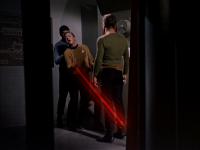
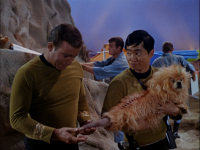
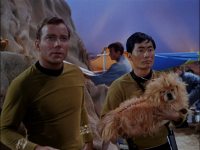
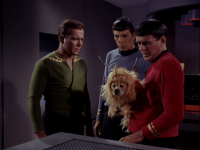
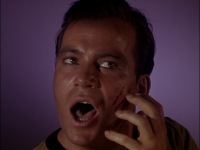
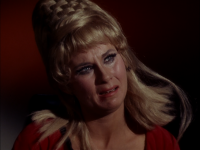
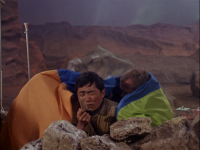
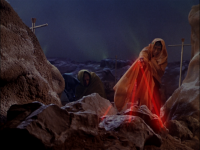
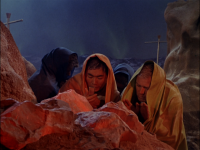
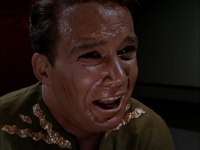
Star Trek TOS - 1x05 - The Enemy Within
Originally Aired: 1966-10-6
Synopsis:
A transporter malfunction creates an evil Kirk. [Blu-ray] [DVD]
Filler Quotient:
3, bad filler, totally skippable.
- Pretty lame episode with no significant long term continuity.
Problems
- It seems ridiculous that there would be no other means to retrieve the landing party other than the transporter. Does the Enterprise not carry smaller landing craft? If so, why can't they use them? There should have been some dialog in the episode explicitly ruling that possibility out.
- At one point, evil Kirk's scratches were on the wrong side of his face due to the image being mirrored for some reason.
Factoids
- This episode establishes that the phasers can be used to store energy in rocks so they can be used as a heating source.
Remarkable Scenes
- Evil Kirk being evil.
- Rand telling her story in the presence of good Kirk.
- Kirk confronting his other half.
- Spock Vulcan neck pinching evil Kirk.
- McCoy regarding the alien dog: "He's dead, Jim." Count 2.
- Spock and McCoy arguing over whether the dog died of terror or some technical malfunction with the transporter reintegrating its two halves.
- Evil Kirk pretending to be good Kirk.
- Kirk's reintegration.
My Review
The Enemy Within is story with a high minded idea but poorly executed characterization. The episode seems so infatuated with the idea of Kirk having two mutually exclusive halves to his personality which he's in a constant struggle to reconcile that they exaggerate the whole ordeal to the point of ridiculousness, overlooking any opportunity to more deeply explore his character in the process. That said, there are a few worthwhile details here and there.
I like how one of the first things evil Kirk does is pursue Rand. It's good continuity with The Naked Time where Kirk expressed hidden desires for Rand. Another nice detail was Spock comparing his struggle to reconcile his human and Vulcan ancestry with Kirk's split in two dilemma. Finally, I certainly do enjoy the idea of exploring human psychology in the sense that we all have more basic instincts that we not only need to suppress but also at times need to draw on in order to reach our full potential.
The trouble is what little exploration of this topic the episode engages in is shallow at best. As such, there's little of value in this story other than the amusement of watching evil Kirk do evil things along with one or two decent action scenes. Overall this is a pretty disappointing offering.
The following are comments submitted by my readers.
- From Bob Dalley on 2008-02-05 at 1:27am:
In this episode when Kirk is on the planet, his uniform has no insignia and even when he and his twin beam up there are no insignia on the uniform. A few scenes later, both Kirks have the insignia on their uniforms. Just wanted to point out this error. You may want to add this to your review. - From Mark J on 2008-03-16 at 10:58pm:
Shuttles were not introduced to starships until around the 'Galileo Seven' episode, which is rather later in Season 1. There was no fanfare to this effect as far as I know.
Apart from perhaps being a little campy, and Shatner eating the scenery (which I quite enjoyed) and the production mistakes (scratches etc) I thought this was a wonderful episode, especially linking the two halves in with Spock's Vulcan/Human ancestry. OK so the pooch was nothing more than a plot device (where did it come from) but this is more than overwritten by the analysis of a man dealing with loss and the fear that he could lose his crew and himself. - From TashaFan on 2008-09-09 at 1:10pm:
I think the lack of insignia on Kirk's shirt is no accident. Since the evil Kirk is supposed to be a mirror image of the good Kirk (I believe the part in his hair is reversed when he first materializes) the insignia on the wrong side of the chest would have made it too obvious that something was wrong to anyone who saw him... I believe this error was deliberate to prevent a bigger problem that would have created a plot hole. The fact that they had to keep reversing the film also accounts for the confusion with the scratches on Kirk's face, most likely. As for not using the shuttle, I remember as a child yelling that at Spock... of course he couldn't hear me. :) - From 411314 on 2009-06-15 at 1:43am:
"They could have ruled shuttles out with an easy one liner, such as the atmosphere having a corrosive effect on shuttle hulls..."
Even then, they should have explained why they didn't beam shelter down to Sulu and the other men on the planet to keep them safe untill they could rescue them. I mean, what was the worst that could happen, that the shelter would split into two of itself? - From Andrew James on 2009-11-18 at 10:34pm:
I loved the use of camera filters to make the "good" Kirk look beautific. - From CAlexander on 2011-04-07 at 5:32am:
I agree, I've always felt the concept here is better than the execution. I've been trying to analyze why. They talk about how it provides fascinating insight on a man's character. What we see is one Kirk with moments of painful indecision, and another Kirk who is decisive but ruled by emotions of lust, hate, and fear. Which I suppose is what they were going for. I think my problem is that I never felt these were two halves of Kirk. I felt that the Good Kirk was the real Kirk. Especially since he is only occasionally indecisive, and it never really hurts him much during the episode, he either gets help from his friends or uses his intellect to overcome it. While the bad Kirk feels like an imposter, not like the real Kirk at all (although he sure is the real Shatner!). We don't really learn anything meaningful about Kirk's character as promised, we see an episode where the crew has to deal with an evil doppelganger of the captain while the captain is suffering from a personal crisis. Which is OK, but not that great. It feels like a few good scenes and a lot of wasted time.
- To 411314: I don't think we know enough about the exact conditions on the planet to complain about how they were keeping warm. They do seem to have beamed down thermal cloaks. Perhaps the crew found it more effective to sit right on the phaser-heated rocks rather than inside the structurally unsound duplicated shelters sent by the ship.
- From Mike Meares on 2012-02-17 at 3:49pm:
"The Enemy Within is story with a high minded idea but poorly executed characterization." - I feel like there is a pattern developing here? lol.
I thoughly enjoy your reviews Kethinov but I sense there is a little "this could have been done better" making it's way into almost every review. I just think this could be said about almost any TV show, especially one made 50 years prior to today.
Despite all the criticisms listed here ( and again they are all valid ) I enjoy this episode very much. I rate it a 5 and I really wish I could rate it higher but the errors are far to glaring to ignore.
I watched this episode again for the 100th time and I still enjoy it. But the techincal errors during the fliming are still a little irritating.
But I beleive the lack of insignia on Kirk's shirt IS, indeed, an accident. When the "other" Kirk first materializes in the transporter room his hair is correctly parted on the left side. The flim was not reversed during this scene nor during the "teaser". So there would have been no need to leave off the insignia.
In fact, the only time I think the flim was reversed was towards the end of the episode when the "kirk's" have their face off on the bridge. The close up of the other "Kirk" was reversed becasue the scratches are on the wrong side of his face. However, I feel this was done by the flim editor who realized that the scene was shot from the wrong angle and corrected it by reversing the flim. ( I guess they were hoping nobody would notice the scratches on the wrong cheek! lol. ) Also in this scene the top part of Kirk's face is cut from view so you really can't tell the part in his hair. It is still a mystery to me as to why the flim editor felt the need to reverse the film. They wanted the other "Kirk" looking left to right instead of right to left. But why is still a mystery?
And the reason I think the lack of insignia was a big mistake was the fact that during the "teaser" neither Kirk had an insignia and during the first scene after that in the transporter room with crewman Wilson the other "Kirk" had no insignia. But the very next scene of Scotty escorting a dazed Kirk to his cabin there is an insignia on his shirt! In fact, from that moment on both "Kirks" have their insignias.
The flim editing was extremely poor in this episode! I could name several scenes that are clearly out of place and moved around. If you are going to move scenes around at least make it look normal.
Despite this though there are a few things I like about this episode. And, again, for me it is the develpoment of the secondary characters. I like the idea of two men manning the transporter. Wilson is a good character, as well as Fisher and Farrow as well. But just like Riley, they were on a couple of episodes and then gone. Too bad.
Also several scenes stand out for me. When Spock tells Kirk he doesn't have the right to be vernable in the eyes of the crew that was very powerful. And again towards the end of the episode Spock explains "being spilt into two halves is no theory" for him. Great scene.
And I resist calling the other "Kirk" evil because I don't think that is correct. Like Dr. McCoy said in the episode that the other "Kirk" isn't "really evil, he's human!" That whole explanation during that scene by the doctor is so great. McCoy was right. Both "Kirks" were the real Kirk.
I don't feel the episode is a waste. But it definitely has it's problems. I do feel that with some rewriting and better flim editing this could have been an outstanding Star Trek episode.
A small nitpick of mine. When Spock says "Thermal Heaters were transporter down, they duplicated. They won't operate." I have to ask myself, If I duplicate a piece of equipment why won't it work? The Transporter Malfunction seemed to be duplicating everything and separting their emotions. Eh........Manchines don't have emotions..... Hello!
- From Kethinov on 2012-02-18 at 9:08am:
Of course "this could have been done better" makes its way into almost every review. Otherwise every episode would get a 10! :)
For most episodes it's the reason for and degree to which it could have been better that's interesting to analyze. Anything else would just be shameless gushing or bashing.
Since most people come here to find which episodes were the best (or worst) of Star Trek, I try to write carefully balanced reviews and highlight both the good and the bad in each episode.
The rating will thus generally be weighted against the "what worked" and "what could have been better" analyses. The pattern is quite deliberate. - From Ken on 2012-07-25 at 12:09pm:
I believe Mike Meares has it correct. The scratches on the other side of the face, were a result of shooting bad Kirk's scene from the wrong angle. I believe they realized that his character would not have been speaking in the correct direction, so they had to reverse the image to make it seem so. However, putting the scratches on the other side of the face was even more noticable. - From warpfactor 10.1 on 2012-08-08 at 10:19pm:
One of the many splendid things about this episode is the animal that is presumably from the surface of the planet. Not only is it able to stand temperatures of - 120 at night but, remarkably, it also looks a bit like an earth dog onto which someone has stuck a horn and antennas.
A little known piece of trivia is that when Margaret Thatcher was looking to use a Star Trek episode title as a catch phrase to demonise the trade unions she had decided on 'The devil in the dark' before Sir Geoffrey Howe, an avid Star Trek fan, convinced the rest of the cabinet that they should use 'The enemy within' instead. She never forgave him. - From Glenn239 on 2012-11-06 at 4:44pm:
‘5’
Sulu: We’re freezing to death down here captain. Can you send us a shuttle?
Kirk: No, don’t be absurd. We can’t do that. We don’t want to break up our set. You don’t want us to have to start collecting all over again, do you?
Sulu: No, but what about the hot coffee we were mentioning in the previous scene?
Kirk: Are you mad? Too risky. What if you drink the angry coffee by accident?
Sulu: Ok. Can you beam down a shelter?
Blankets? How about a fireplace with a warm fire already burning in it? How about just heating stuff up from around the ship and beaming it down? Can you at least phaser out a hole in the ground so that we can get out of the wind?
Kirk: No, no, no, no and no. Stop whining and be the dramatic tension of the episode like you’re trained to be. Oh – and those phasers you used to warm the rocks around you three scenes ago? Nice try mister. We’re beaming those up so that you can’t do that again.
Sulu: Captain, this episode has a lot of holes in it.
Kirk: I know. The most interesting premise was when evil Kirk was going to abandon you, but we even screwed that up by making sure that the whole crew knew it was the wrong Kirk. We’ll try again later this season. Next time we’ll explain the shuttle thing by having it be a shuttle accident. Instead of two of me, we’ll have some dickish Commodore. It’ll be great. Kirk out.
Later that day…
Kirk: So you see, Yeoman Rand, it wasn’t really me, it was just the evil part of me.
Rand: Oh, yeah. Merely the half of you that wants to rape me. Nothing to worry about there.
Kirk: Yes, that seething cauldron of raw aggression is safely back where it belongs – inside me, frothing just below the surface, and held in check only by the will of that super wimpy guy you saw who couldn’t decide his way out of a paper bag.
Rand: Perfect.
Kirk: Really?
Rand: Yes, captain, you see I’m a women. I crave long-winded overly-rational explanations for all my relationship difficulties, and I do not hold grudges for past slights far into the future. I’m sure that you being slapped back together in some untested half-assed transporter experiment has worked perfectly well, and there’s no possible way that you’d have nodded your head to Spock indicating you were properly balanced if you were not. Nothing could possibly have gone wrong there.
Kirk: Wow, this show really is out in space, isn’t it?
Rand: Yes, and I look forward to being part of the adventures for many more seasons to come.
Kirk: I’m sure you do.
- From Schreck on 2013-05-23 at 6:31pm:
Our first transporter accident episode sees kirk split into two halves, the uninhibited and the meek…although this episode has a good premise the execution is poor…Shatner’s acting is good, but even that can’t save this episode…I give it a 6.25 and my brother has it as his third lowest of the original series coming in at a 5.5 - From Trekkie on 2013-06-21 at 4:43pm:
This episode, in my opinion, was one of the better episodes. I liked how they showed both Kirk's evil and good side, and also how the episode states that we need to have a little of both (good and evil, that is) in order to make beneficial desicions and be stable. - From Katie on 2013-07-07 at 6:24pm:
Aside from all the other plot contrivances, why was it so hard to find "evil Kirk"? Why didn't "good Kirk" just stay on the bridge and announce that any "Kirk" not on the bridge was the imposter?
I mean really. - From 10toes on 2015-08-09 at 11:46pm:
Actually, only the last pill was placebo. The ones before that were the real deal.
Still, doesn't explain why that last pill changed her appearance...
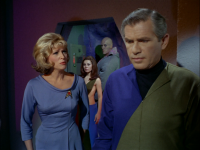
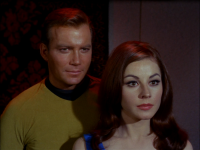
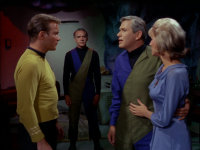
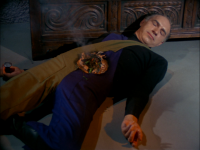
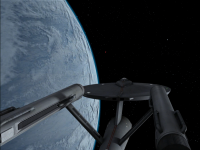
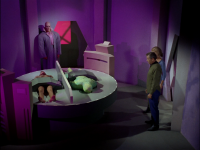
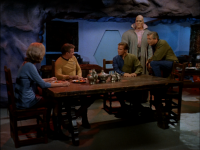
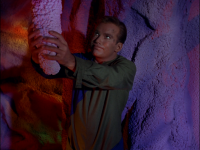
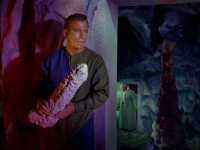
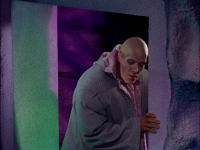
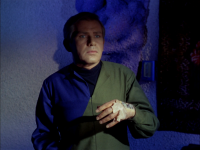
Star Trek TOS - 1x07 - What Are Little Girls Made Of?
Originally Aired: 1966-10-20
Synopsis:
Nurse Chapel's long lost fiance is found. [Blu-ray] [DVD]
Filler Quotient:
3, bad filler, totally skippable.
- Pretty lame episode with no significant long term continuity. Dr. Soong on Star Trek TNG will later (re)invent androids, but it is presumed that his work occurs in isolation with no connection whatsoever to Dr. Korby's discoveries.
Problems
- How could Kirk have strangled an android Korby?
Factoids
- This episode establishes that Kirk has a brother named George Samuel Kirk. He has a wife and three sons. Kirk calls him Sam.
Remarkable Scenes
- Kirk killing an android.
- Kirk being "cloned" into an android.
- Kirk debating with his android counterpart.
- Android Kirk calling Spock a half-breed.
My Review
While it's annoyingly unoriginal to frame another episode around a Kirk double and another guest star with a hidden agenda, I quite liked Kirk's method of making Spock aware of the impostor by filling his thoughts with hate for Spock during the creation of the Kirk android. Kirk couldn't have known for sure that his tactics would work, so the entire attempt was just one big lucky guess. Nevertheless, that sort of boldness is exactly what makes a good captain.
However, the real meat of the episode lies with Dr. Korby's discovery of technology from an extinct alien civilization capable of manufacturing androids. This technology is even capable of transferring the human consciousness into an android, a capability that he uses to save his life, after which he apparently makes no attempt to contact Earth because he's afraid that his people would find his discovery somehow distasteful. This seems like an irrational notion up until the point when the Enterprise arrives and Kirk and Chapel seem to validate Dr. Korby's irrational fears by reacting with horror at the very idea that Korby has created androids. Kirk even compares him to Hitler at one point without much of a reason.
At about 32 minutes into the episode Korby proposes seeding androids incognito to Earth and its colonies in secret as a means to avoid what he believes would be mass hysteria if their existence were to be widely known. But rather than relieve Korby of his paranoia by explaining to him that that would be unnecessary and that Earth would welcome him, his discoveries, and his android counterparts into the fold, Kirk spends the entire episode overreacting to Korby's overreaction. The ensuing conflict results in the deaths of everyone on the colony and then Kirk goes about his merry way as if nothing of consequence has occurred.
In so doing, the implications of the existence of this android technology are wasted and forgotten. Kirk makes no attempt to retrieve or preserve the technology and the episode itself seems to condemn the very existence of such a technology. At several points, the episode goes out of its way to make the argument that an android which thinks it's superior to a human is a threat which must be destroyed. The episode also demonstrates that the androids were emotionally unstable and not very good critical thinkers, seeing as how Kirk was so easily able to exploit conflicts between their emotional states and their programming. While it's clear the technology has flaws, none of this is enough to support the episode's apparent condemnation of the very idea of androids.
Instead what I can only assume the episode intended us to believe is that Korby was lying to Kirk and that his real intent was to replace key personnel on Earth and its colonies in order to take them over. This is certainly a possibility, given the Kirk double and Korby's admitted desire to keep his discoveries a secret, but at no point in the episode does this premise become conclusive. At best, Kirk could only have a reasonable suspicion of Korby intending to do such a thing and it was as irresponsible for Kirk to act on such a suspicion without proof as it was for him to make no effort to preserve or retrieve any of the technology found on that planet for further study. Overall a pretty lackluster episode.
The following are comments submitted by my readers.
- From djb on 2009-01-04 at 5:21am:
Kind of a ho-hum episode. As you said, the best part of it was Kirk getting a message through to Spock through his double.
Also, there seems to be some inconsistency as to what kind of "emotions" these droids are capable of. Also, androids wouldn't "forget" anything, only to have their memories jarred later on-- they would remember everything in perfect detail, unless they were actually programmed to forget, which they wouldn't be. Kinda weird.
One nitpick too-- Andrea isn't technically an android. She's a gynoid. A rather comely one, at that! - From CAlexander on 2011-04-15 at 4:38pm:
Another episode which doesn't come together in execution. In retrospect, I think there could have been something interesting to this story - the idea of Korby saving his life by transferring his brain to an android, then realizing that he is no longer the same person after doing so. But much of the episode consists of Korby boasting about how great his plans are, and it didn't convey a lot of meaning. Nor was I interested in Nurse Chapel, or all that weird TOS stuff about robot logic. Still, it isn't all bad. I like the parts of the plot relating to the android Kirk. His revelation at the dining table is pretty creepy, and the real Kirk's use of "post-hypnotic suggestion" is clever.
- I don't agree with the comments in the review. Korby lures down the Captain, murders two people, holds the captain hostage, and has Ruk impersonate him to cover up his crime. He then claims Kirk should bear with him, he has a good reason for it. To paraphrase, his reason is that people are too stupid to know what is good for them, so he needs to secretly take over the Federation so he can kill everyone and transfer their minds into a superior race of androids. Korby may sound mild-mannered, but actions speak louder than words, he has totally flipped out into Megalomaniacal Super-Villain territory. Kirk's sole responsibility is to stop Korby and save the Federation. That is my main complaint with the episode, that all the philosophical arguments are basically irrelevant because Korby has become such a monster.
- From Mike Meares on 2012-02-22 at 2:31am:
My biggest problem with “What are little girls made of?” is that it never does seem to make a whole lot of sense. Nothing seems to add up during the entire episode.
Now the idea of Machine vs. Man has been played out in many a Star Trek episode. It is always the emotionless machines who lose out to the warm blooded humans who demonstrate that they are more compassionate and understanding. Yea right, and if you believe that I have some swamp land I want to sell you.
But to me the main problem with this episode is the story doesn’t ever really make sense.
If Dr. Korby was indeed an android then how can he express emotions like he does? All the other androids act like they are emotionless programmed robots. But not Korby. That doesn’t make sense.
If Andrea is an android, or a gynoid, then why does she kill the android Kirk just because he wouldn’t kiss her? That doesn’t make sense.
This episode was shown just three weeks after the “Naked Time” when Christine expressed her undying love for Spock. The timing of this episode always seemed a little bit strange to me.
This episode is by far and away the weakest one of the entire first year of TOS. I have tried to watch it a dozen times and I always get disappointed with it.
I agree with CAlexander that Dr. Korby acts insane from day one and Captain Kirk doesn’t overreact at all. I think the comparisons to Hitler are good ones. Hitler wanted to create the master race, and Dr. Korby does too in a strange way.
But even discussing the story seems weird because the story never seems to fit right.
I agree that the cutest thing about this episode was the android Kirk yelling at Spock. But even that didn’t make sense. Being an android with a computer for a brain, why didn’t the android Kirk realize what he has just said to Mr. Spock?
And right after the android Kirk yells at Spock he then turns right around and says to Spock in a very concerned tone, “You look upset Mr. Spock, is everything all right up here?”
In the first place Spock didn’t look upset and even if he did ( which is debatable because after all he is a Vulcan! ) ………even if Spock was upset, would an android ask him if he was all right? I don’t think so! That really didn’t make sense!
All in all a very forgettable episode! Well not totally forgettable! I did write this review! Maybe a nightmare of an episode would be a better choice of words. - From mandeponium on 2012-08-25 at 4:55pm:
I agree with the review and comments, not a great episode. But to me the most impacting parts of this episode were Andrea's outfit, followed by a naked Kirk spinning on a merry go round. Made the the whole episode worth it. - From Alan Feldman on 2012-09-26 at 5:09pm:
"What Are Little Girls Made Of"
At 16:35, Kirk says, "That's why all this make no sense." Drop the "that's why" and it pretty much sums up this episode. Well, it starts out okay, but it makes less and less sense as it goes on. At the end, "making sense" gets entirely thrown out the window.
Re mandeponium's commentary:
The "most impacting part" of this episode is not Andrea's outfit; it's Andrea *in* Andrea's outfit!
Speaking of outfits, Rock's is, uh, a bedspread? A space blanket?
Rock is fun to watch. When he shows great strength throwing the Captain about, it's intense!
The hand-held shot of Kirk walking down the corridor and into the turbo lift is also used in "The Man Trap". It's the same shot! The Man Trap: 21:28, Little Girls: 37:34.
Mike Meares asks: "If Dr. Korby was indeed an android then how can he express emotions like he does?" The difference, I believe, is that Korby contains a "transplanted" consciousness, mind, soul, or whatever -- while the others do not. On the other hand, Rock showed anger toward "The Old Ones" and Korby, and exultation when he realized "existence -- survival must cancel out programming." Are these not emotions?
Kirk strangling Dr. Korby? Yes, that's nonsensical. I guess we're not expected to remember that far back* in the episode once we learn he is an android. I suppose some do and some don't on a first-time viewing. And what caused the "skin" on the back of his hand to be sheared off? The wall, the door? Not very durable, after all!
* About 9 minutes.
The scene in which Korby kills Rock has Rock close to him, then far from him! The sequence of shots is not self-consistent. And why does he walk so slowly toward him? I guess he's struggling to override his programming to protect Korby. But the sequence is still inconsistent.
The mind is what the brain does, so you can't transplant a mind, or one's consciousness, or whatever you want to call it. Copying, I can see. And here we have a mind (not brain) being "transferred" and "re-programmed", to boot! Talk about mind-altering!
To comment on everything in this episode that doesn't make sense would fill a small book. Nevertheless, Rock and Andrea are fun to watch.
AEF - From Schreck on 2013-05-23 at 7:32pm:
Another weak first season episode that fails to draw us in although I do enjoy a good Chapel episode…it bothers me that she was never considered a regular crew member along with Rand…I give it a 6.5 and my brother a 7 - From Bert on 2014-03-27 at 6:11pm:
I'm going to have to go back and watch the episode, but I never had a problem with it. Part of it is, you have to think about the attitudes at the time. Robots and androids were generally considered scary monsters. In movies they were almost always either evil or messengers of doom. In novels and short stories, it's the same thing. It's the reason Asimov came up with his three laws, so mechanical men wouldn't realize they were smarter/faster/stronger and take over the world.
When eveyone assumes something, you don't generally feel a need to spell it out. And when you discover a technology no one will trust, you hide or bury it. - From Alan Feldman on 2014-04-16 at 11:36pm:
djb writes: " Also, androids wouldn't "forget" anything, only to have their memories jarred later on-- they would remember everything in perfect detail, unless they were actually programmed to forget, which they wouldn't be. Kinda weird."
You're assuming perfect programming and perfect hardware, neither of which exist (well, above a certain complexity level, anyway, which we have surely reached in this case!). The old memories are probably archived and are therefore not easily accessible. Also, cosmic rays can flip bits. Not very often, but Rock has been around a very long time. Furthermore, androids are supposed to resemble humans. In this case at least some of them are able to "import" another's very consciousness (which is kind of ridiculous), so must resemble humans in some sense. Perhaps Rock was of that type.
OTOH, these androids are far more advanced that anything we have today. But they're still designed to be like humans.
Anyway, the whole story is ridiculous. Another example: "Don't you see, Roger. Everything you've done proves it _isn't_ you." Ah, so A doesn't equal A. You're not you! You're someone else! This sentence is false! Right.
The only reason to watch this ep, IMO, is Rock and Andrea in Andrea's outfit.
AEF, a.k.a betaneptune - From peterwolf on 2015-11-06 at 11:43pm:
The complicated review searching for a point without really finding it proves that there is more to this story than a plain "man versus machine". Although I do not like the creation scene, when Kirk and the proto-biomass are spinning like crazy, the rest is rather entertaining and full of serious topics. Men (or the old ones) made copies of themselves, perhaps only machines or beings which could be sentient. In this episode, no one ever uses this word (I checked the transcript), which later becomes so important for Star Trek: "a sentient being". Ruk and Andrea seem to be just on the edge of being sentient, perhaps Kirk´s copy too? Ruk shows something like anger, Andrea something like love; both could be simple simulations/emulations, but Korby seems to have transferred his complete mind to his android body copy, and, thus, still himself. I think one idea of the episode, which is admittedly not perfect and lacks humour, is contained in the statement of copy-Kirk, who says "Thank you. I felt quite at home on the Enterprise." Would a purely logical computing machine say something like that? This episode is a forerunner of all the Data episodes and we should be grateful for it. Some eerie and very good scenes are the ones when the android Ruk uses different voices, and in particular, to deceive Kirk, who is knowingly responding to it. Such things were used in X-files episodes as well. Strange enough, the only humour is brought about by Spock, complaining that Kirk was using the rude expression halfbreed ... - From Royy on 2016-11-16 at 7:05pm:
I feel this is a greatly unappreciated episode. I think it is wonderful mainly three reasons:
1. For me, it is the Star Trek equivalent of Conrad's 'Heart of Darkness'. Like Conrad's Novella, the protagonist ( Kirk) goes in search of his hero, only to find he is not what he expects? The plot is subtle, and the diverse dillemma's that provoke alot of thought for me.
2. The acting is superb. I especially love Dr Corby. I wish they had used him as a villain again e.g. Instead of Kahn.
3. That female android ... She is gorgeous.
I can watch this again and again. I pick new things up all the time.
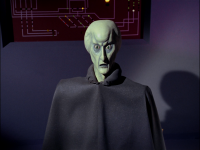
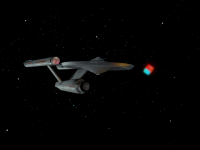
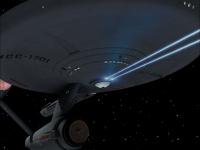
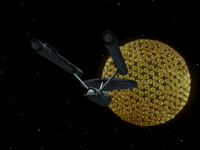
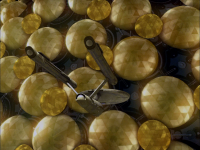
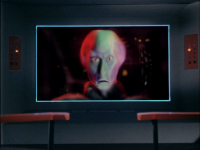
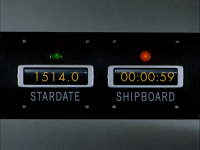
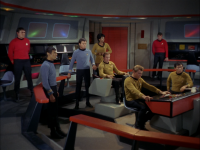
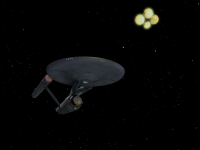
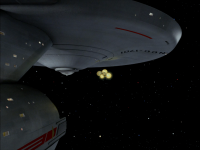
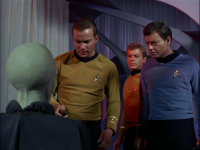
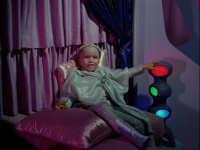
Star Trek TOS - 1x10 - The Corbomite Maneuver
Originally Aired: 1966-11-10
Synopsis:
Kirk bluffs his way past what appears to be a powerful alien. [Blu-ray] [DVD]
Filler Quotient:
3, bad filler, totally skippable.
- Pretty lame episode with no significant long term continuity. The factoid about Spock's parents is nonessential and can be gotten in context in later episodes when it becomes relevant.
Problems
- Visual continuity is a bit off in this episode because it was one of the earliest episodes to be produced despite it being aired so much later. As such, it's easy to notice some obvious out of place details, such as Uhura's uniform being the wrong color.
- Why did Scotty tell the away team to bend down to accommodate the low ceiling when the next room over was tall enough? Why not just beam them into that room instead?
Factoids
- This episode establishes that the Enterprise can fly at warp speed in reverse.
- This episode was nominated for the 1967 Hugo Award for Best Dramatic Presentation.
Remarkable Scenes
- McCoy purposely ignoring the red alert to make Kirk finish his physical...
- McCoy: "What am I, a doctor or a moon shuttle conductor?" (Count #1 for "I'm a doctor, not a [blah]" style lines McCoy is famous for.)
- McCoy, talking to himself: "If i jumped every time the light came on around here I'd end up talking to myself."
- The Enterprise's attempts to escape the cube and eventually destroying the cube.
- Kirk complaining about having a female yeoman.
- Sulu very quickly compensating for Bailey's delinquencies.
- Kirk determined to help the enemy in need.
My Review
An episode with a terrific theme and a terrible execution. The spirit of Star Trek and the mission of the Enterprise, to peacefully seek out new life and new civilizations, is demonstrated to its fullest effect here. Despite what easily could have been an armed conflict with what appeared to be a hostile alien species, Kirk's actions prevail in cultivating a peaceful ending, complete with establishing diplomatic relations and a cultural exchange. That all sounds great until you start to examine the details of the plot more closely, at which point unless you're willing to put up with a lot of stylistic oddness, the episode comes off as largely a dramatic failure due to its overwhelming awkwardness.
There are three details of the plot which render the episode difficult to watch. The first and most obvious detail is the incredibly slow pace. I bet I could find over ten minutes of unnecessary material to cut from the episode just from the various scenes where dramatic music plays while the crew stares anxiously at the viewscreen awaiting their impending doom. It's completely unnecessary for us to spend so much time taking in closeups of each individual character's reaction to each individual plot development several times in a row. Camera focuses on viewscreen, camera focuses on crew, camera focuses on viewscreen, camera focuses on other crew... gets old fast.
But even editorial cuts to speed up the pacing wouldn't save us from the insufferable behavior of Bailey and Balok. Bailey's oft-recurring incompetence and emotional outbursts happened so frequently that I found myself largely agreeing with McCoy's flagrant questioning of why Kirk ever promoted the guy to a bridge officer in the first place. Likewise, Balok's overwrought and intensely awkward proclamations of doom and gloom at various points throughout the episode were reminiscent of the sort of bad acting you'd expect to find listening to a cheesy sci fi radio show from the 1950s. Granted, the acting on this show is not typically stellar, but Balok's was bad even for this show's standards. As for the "real" Balok revealed at the end, the less said about that aesthetic choice, the better...
The final difficult detail to deal with is Balok's shoddy reasoning for his stated motives for his actions, something which is becoming all too common on this show for antagonists. Throughout the episode, everything Kirk does just seems to irritate Balok more and more for no particular reason. Every time Kirk offers Balok the hand of truce and friendship, Balok slaps it away. He claimed he did this to rule out deception in Kirk's statements, but in so doing he gave Kirk plenty of reasons to flee and leave Balok's ship disabled in order to ensure a safe escape. Had Kirk chosen to do that, Balok never would have gotten a chance to participate in the peaceful cultural exchange he desired. As such, his tactics were flawed and worked only because of Kirk's innate desire to take questionable, unreasonable risks in the spirit of fulfilling his mission.
The following are comments submitted by my readers.
- From John Bernhardt on 2010-01-12 at 5:44pm:
This was the first episode produced after the two pilots. - From Paul Loudon on 2010-10-01 at 2:22pm:
Uhura is in a yellow uniform because it is only the third episode ever filmed, her first appearance and hence they were still working these finer points out. - From CAlexander on 2011-04-11 at 4:13pm:
I thought this was a solid episode, though certainly not perfect.
- I thought Balok's behavior was strange too, but I interpret it differently. His ship was never really disabled. He was essentially a superbeing who was testing the crew. Superior races in Star Trek consistently have very picky opinions about what makes a lesser race worthy of contact. So I believe he was testing them to see if they "had evolved to a point" where they were worthy of a cultural exchange.
- I agree that Balok's acting is way over the top. But I don't mind, it is part of the charm. Except that his repetitiousness gets monotonous after a while.
- I agree that some of the scenes are stretched too long. On the other hand, it can be nice to see a show with a slower pace once in a while. After all, it is still a lot faster paced than real life.
- My main complaint has always been that I was quite unimpressed with Kirk's bluff. Everyone acts like it is this daring poker bluff, but to me it sounds more like a caricature of a bluff. It is the sort of bluff I might create if I was writing a story about how great Kirk is at bluffing, but had no creativity myself to come up with a clever bluff, so instead I just write that Kirk says something ridiculous and the enemy believes it, "proving" that Kirk is a great bluffer. The bluff is ridiculous; his delivery is good, but not that good. Fortunately, the story doesn't depend on Balok believing the bluff; I assume he didn't, but just pretended that he did as part of the test.
- I like the bantering between Kirk and McCoy. Except for the complaints about having a female yeoman – what is that all about?
- Science Note: The cube is 107 meters on a side and 11000 metric tons. But Scotty says the cube is solid. That would make the density of the cube extremely low, around 1% of the density of water, so it is made of something very lightweight.
- From Mike Meares on 2012-02-26 at 3:03am:
I thought this was a great episode! Maybe not perfect but is anything really perfect? I thought the Corbomite Maneuver was one of the best episodes from the first year!
And considering it was only the third episode filmed in the series the execution was pretty darn good.
What I thought was flawed was Kethinov’s review.
The Corbomite Maneuver was taut, tense and dramatic and it keeps you on the edge of your seat the whole time. What Kethinov calls the “incredibly slow pace” was actually what I loved most about this episode. You can almost feel the tension the crew is feeling as you are watching it. I always enjoyed it when Kirk and McCoy butted heads and their heated exchange in this episode is really good. You can even see the sweat on the crew’s faces which made it all the more realistic.
When Kethinov complains about the pacing I can almost hear Bailey saying, “I don’t understand this. Spock’s wasting time. Everybody else just sitting around. Somebody’s got to do something!” The feeling Kethinov gets from watching the episode is exactly what the crew is feeling. And that is what good drama is all about.
Granted the corny figure of Balok leaves a lot to be desired, but look at the shoestring budget the network had them on. Cut them some slack please. A chessy sci-fi radio show from the 50’s probably had a bigger budget.
And as for Balok’s motives I totally agree with Calexander here. Balok was from an advanced race and the whole thing was a test to see how the Enterprise would respond. Did we really believe that Balok would destroy the Enterprise at the end of the ten minutes? I thought so at the time but looking back I can now see he had no intention of ever doing that. When he allowed the Enterprise to “supposedly” disable his ship this again was another test. If the Enterprise left him to die on his own then he knew this was not a race Balok’s people wanted to have any contact with.
Fortunately, the writers had the Enterprise, or more correctly James Kirk, make the right choice. That of placing the safety of alien life above the safety of his own life. This kind of moral is what DID SET ( past tense!!!! ) Star Trek above all other science fiction films and TV. And why I enjoyed the first two seasons of Star Trek ( and a couple of the Star Trek movies )so much.
As for the bluff, I loved it. I still do. I still crack up every time I hear Spock say, “A very interesting game, this poker.”
And I always wondered if McCoy ever did teach Spock to play poker? LOL.
As for Kirk’s complains about the female yeoman, I think he was just venting to McCoy about Rand “hovering” over him like a mother. Which brings me to my only complaint of this episode, and really it is a complaint of the series as a whole. And that is the role of the yeoman was always played by a woman. I felt this was sexiest. I think you will find in the U.S Navy over half the yeomen are exactly that MEN! Nowhere that I have ever seen has there ever been a male yeoman in Star Trek and I think it is a weakness of the series as a whole.
All in all a thoroughly enjoyable episode and one I would highly recommend to anyone starting out watching Star Trek! - From Alan Feldman on 2012-09-23 at 6:17pm:
The Corbomite Maneuver
Terrible story, but with some fun moments here and there.
In short, the main problem with this episode is that Balok is incredibly cruel and unreasonable -- and that this is somehow justified by the claim that he was only "testing" the Enterprise crew, albeit with faulty logic, to determine their "true intentions".
Re Kethinov's review: I mostly agree with it, but I think that his final paragraph goes too easy on the episode.
>----o----<
On to the story:
The Enterprise is minding its own business when a "space buoy" chases our heroes down and holds them trapped for what will be 18 hours. (What did they do during that 18 hours?)
OK, they convene in the briefing room. Uhura looks like she's sitting through a long, really boring class. And Sulu has his head down on the table! Were they in that briefing room the entire 18 hours?
I like this dialogue:
[In the briefing room]
KIRK: Anything further, gentlemen?
SPOCK: I believe it adds up to either one of two possibilities. First, a space buoy of some kind.
KIRK: Second?
SPOCK: Flypaper.
KIRK: And you don't recommend sticking around.
SPOCK: Negative. It would make us appear too weak.
KIRK: It's time for action, gentlemen. Mister Bailey . . .
So it took 18 hours to get to this point?
OK. Kirk finally decides it's time for action. He decides to try to get away from the thing in a spiral course. So Balok tightens his grip on the ship and then has his "space buoy" bombard the Enterprise with deadly radiation. Kirk recklessly waits until near-lethal levels are reached and then finally fires phasers to destroy it. (Just what exactly was he waiting for? I found myself screaming at him, "Fire the phasers already!") And then Balok has the chutzpah to complain!
"Having ignored a warning buoy, and having then destroyed it, has demonstrated your intention is not peaceful."
What? Acting in self-preservation somehow demonstrates hostility?
OK, after destroying the cube, the Enterprise goes forward.
Then the giant flagship Fesarius puts a tractor beam on them, takes control of the ship, gives them 10 minutes to pray or what, after which they will be destroyed. The Enterprise ejects a recorder marker but Balok destroys it. Bailey loses it. Then the bluff trick. But what if Kirk hadn't made the bluff? What would Balok have done? Destroy them? Probably not. But the Enterprise crew didn't know that! That leaves, "Ha ha, just joking!" Seems pretty damn cruel to me. And couldn't they have dispatched a "subspace" message instead?
Then more crap from Balok with the small tow ship and such. And Kirk nearly ruins his ship to pull free. This scene goes on for too long. And somehow the Captain knows the "maximum temperature" is way off. OK, maybe there is a huge safety factor implicit in the "maximum temperature. Nonetheless, we have Kirk being totally reckless again.
Now, after all this crap Balok put them through, Kirk is supposed to respond favorably to a distress call? This is all some kind of test? Test of what? To see how much crap they'll put up with and still respond to a distress call?
It's like you and your comrades are POW's of a ruthless enemy. You've been horribly mistreated. Then you are forced at gunpoint to line up against a wall, face the wall, after which you are told you are to be shot. Then the soldiers lay down their guns, pick up some cameras, and shoot photos of them. This is effectively what Balok did to the crew of the Enterprise. Would you want friends like this?
And how about testing Balok? Is his behavior somehow acceptable? NO! It's cruel. Pure and simple. I mean, why can't we test _him_ for _his_ intentions? What would _you_ conclude from his behavior? Granted, it was the Enterprise that was trespassing, but the crew had no reason to believe that. And once Balok confronted them with the spinning cube, he proved that _he_ was the one who had hostile intentions and was being totally unreasonable, to boot!
There's too quick a resolution too late in the show. It feels like a cheat. Similar to a "deus ex machina", though I'm not sure whether this is really the same thing or not. Regardless -- I mean, really: Balok: "It was a pleasure testing you." . . . Kirk: "I see." That's it? And that, all of a sudden, makes everything hunky-dory? Couldn't Balok at least have apologized: "Sorry, gentlemen, for scaring you half to death and nearly destroying you and your ship, but it was 'only a test', and I got a real kick out of it." Yeah.
It's annoying enough having a sudden last-minute out-of-nowhere save like this, but to help someone who put you through such hell for no good reason? Hell, on that note I'd think an alien with this much power need not fear the Enterprise in the first place.
And then they leave Bailey behind! Who's to say Balok won't put him through hell just like he did the Enterprise and crew? How do they know that Balok will ever let Bailey return? And what about the cuisine?!
Would _you_ want to hang out with this Balok dude?
>----o----<
A few short points:
Bailey reports that the buoy is 1593 meters distant. That's about a mile! It's clearly a lot closer than that. (I only have the re-mastered version, unfortunately. So I don't know if it's the same in the original.) And based on the ship being 289 m long and the spinning cube being 107 m on a side, the scale of everything is _way off_ anyway.
It's funny when Janice places the napkin on Kirk's lap. How could Grace Lee Whitney do that with a straight face? Now that's acting!
Spock says that Balok is "in some manner reminiscent of [his] father". Say what? Totally absurd. Please. This must have been some desperate "filler" material.
Uhura says "hailing frequencies open" some seven times, and practically nothing else until the end when she tells us about Balok's "distress signal".
About that shot of Sulu turning around at about 7m20s: Is this the same shot seen in many other episodes?
Rand with the coffee: Nice random element to throw in. Nice contrast to the gravity of the situation.
This Balok dude is really into curtains, no? His "ship" doesn't look much like a ship. It looks like a curtain store. Must be a budget-saving device.
Which ship was which? When I first saw this episode literally decades ago I thought the small ship was not manned by Balok. Balok stayed on the big ship, safe from any possible Corbomite device and thereby thwarting Kirk's bluff! But as I watch it now it looks like he _was_ on the little tow ship. So what was the point of that? And why does he have the big ship?
Memory Alpha has a page about the Fesarius: http://en.memory-alpha.org/wiki/Fesarius. Among other things, it explains that the special effects to make the large ship was so difficult that it held up the episode, resulting in it being the tenth to be shown.
Balok says he thought his distress signal was "quite clever". In isolation it _was_ clever, as the distress call was aimed at "the mother ship", and likely not strong enough to be heard (though I'm not sure how you could determine these things). But this is not a dude deserving rescue.
Spock was clearly unhappy about not finding a solution to the problem. Is this not emotion?
Boy, it didn't take long for Scotty to evaluate the engines!
>----o----<
On the bright side:
o Yeoman Rand serving greens to Kirk.
o The look of evil Balok.
o Spock, Bailey, and Sulu in the adrenaline-gland scene.
o The hilarity of the briefing-room scene.
o The chess and poker bit. Spock: "A very interesting game, this poker."
o Yeoman Rand serving coffee.
>----o----<
On readers' comments:
John Bernhardt pointed out that this was the 1st post-pilot production. Quite believable, as Spock is still using his "loud voice" from time to time (and complains about Bailey raising his!). He clearly still has at least some of the mannerisms of "early Spock" from the pilot episodes, though to a lesser degree.
I agree with CAlexander about Kirk's bluff being not that good and such.
A similar Corbomite bluff was used in "The Deadly Years", but was better-played and more believable as a severe-overkill self-destruct mechanism, as opposed to the "reverse reaction" mechanism we see here.
Re Mike Meares' comments:
There's "keeping you on the edge of your seat", and there's "let's get on with it already". I found this episode to be more of the latter.
Why should one place the safety of alien life above one's own? (And this goes double for such a cruel alien.) Behavior like that would quickly doom a species to extinction.
AEF - From Strider on 2012-10-06 at 6:01am:
This is one of my favorite episodes, and I watch it frequently, all the way up to the last segment with Balok. I always turn it off when they're going into the transporter. I actually love Clint Howard as an actor, but I hate that last segment.
But up to that, I think it's one of the best episodes in the series. Kirk completely owns this episode. He's human enough to be anxious about the fate of his ship and crew, but he's the one that comes up with all the solutions. Even Spock is ashamed that he can't come up with any logical solutions. And for once, they get out not because some all-powerful entity decides to let them go, but because Kirk is ingenious and courageous. The crew is in awe of him; you can see it on the faces of everyone on the bridge from Spock to Sulu.
I never found the pacing slow. I, too, found that it built tension throughout the episode. When they counted down the 10 minutes and then they didn't die, that was a huge moment! You can't create moments like that without investing some time in it. - From Dos Flores on 2012-12-28 at 5:36am:
Oh dear. I was nodding along with each of your episodes reviews and ratings, right up to this one - one of my favorite!
I thought the pacing, really quite different from typical original series fare, was one of its selling points. Was Balok's behavior and response over-the-top theatrical in its Booming Menace and Evil? Well, yes! Because it *was* an act, one-dimensional and heavy-handed, designed precisely to be unreasonable, in order to put them through a dramatic wringer, psychologically, and see how they'd react under duress. And the disabled ship may have been, as someone suggested, a poor way to test their altruism, considering what he had just put them through, but it was a great way to test their level of aggression or vindictiveness, precisely BECAUSE of what he had just put them through. There was a third option, after all, besides either aiding or not aiding a helpless and disabled enemy vessel... what would a Klingon commander have done in that exact situation, for example?
This episode was also some of Shatner's most restrained acting, and it's a nice reminder of the fact that, when ego and diet pills weren't making him, well, Shatner, he really *could* act. I liked this completely grown-up Captain Kirk, and can actually see him with some emotional weight on him in that command chair. His interactions with McCoy, including quietly snarling at him under pressure, feel real, as do his frustrated attempts to get through to an obviously overmatched bridge crew member. ("Promoted too fast"... uhm, ya think?) He certainly would have made my short list of people to maroon with a strange alien...
And more! The scenes between Spock and Kirk this early in the series are a huge selling point for the episode, laying such fine groundwork for what is already being shaded as a deep connection. When Kirk, stressed out by the unreasonable countdown to destruction, verbally cuts at Spock for not having a magic-bullet solution, Nimoy just nails the response. You can see his sense of having personally failed the Captain, and it hurts. Plot holes? For sure. But no more than I think are typical for the series overall, and with some nice tension and pacing for distraction! - From Schreck on 2013-05-23 at 9:08pm:
A very early episode that is very slow moving, but offers a few nice moments that clearly show where the crew and Kirk will be going in the future…plus we get Clint Howard!!! I give it a 7 and my brother a 6.25 - From CAlexander on 2013-09-03 at 10:07pm:
There has been some discussion about whether Balok’s behavior is reasonable or unreasonable, but I would like to point out that our judgment of Balok’s behavior makes no difference to the episode. We have to keep in mind what Kirk’s mission is. Kirk’s mission is to establish peaceful relations with Balok’s people. If Balok’s culture considers it appropriate to put strangers in mortal danger as a test of character, it isn’t Kirk’s job to tell them that their cultural customs suck. How does it benefit the Federation to needlessly antagonize foreign cultures by denigrating their value systems as inferior to that of the Federation? Kirk’s job is to suck it up, smile, and make good relations with the strange representative of an extremely powerful and dangerous foreign government. - From Alan Feldman on 2013-11-17 at 2:42am:
To Dos Flores:
Regardless of whether this was a great way to test Kirk and crew (and I claim it wasn't), how can you possibly justify such cruelty? You seem to have absolutely no concern for the well being of our heroes. Take the radiation attack, for example. Even though it did not kill them then right there and then, it must have surely caused numerous cases of radiation sickness. (Realistically, it would have. Well, I suppose it turns on just what Spock meant by "tolerance level" and "lethal zone". It's not like everyone would instantaneously drop dead at any point, but having entered the "lethal zone" it seems to me that many should have gotten radiation sickness and cancer and what not. Hey, just for the test, right?) And the Enterprise might have easily been destroyed at some point. A lot of wear and tear, at least. These things are somehow insignificant and justified?
To Dos Flores and CAlexander:
What would you have thought if Captain Kirk and crew did all this to a technologically inferior culture who were just minding their own business, just like the Enterprise was? What if either of them did it to you? And if you have children, them? Your kids getting radiation sickness? Just for the test, eh?
This was like an elephant testing the intentions of a mouse.
To CAlexander:
Balok was way beyond unreasonable. He was evil, pure and simple. And he deserved zero good will, irrespective of anything else. Severe punishment would be appropriate. He bombarded the Enterprise with lethal radiation for crying out loud! That's pretty damn hostile, if you ask me.
What about the Axis powers? Would you have tried to establish peaceful relations with them? Hmmm. Someone tried with one of them. It didn't turn out too well. So you would say that maybe they were just testing us? That our job was to suck it up and let the Axis powers have their way?
Kirk frequently denigrated alien cultures' customs. He also did something about it! Here's a list.
Romulans and Klingons in any episode they appear in.
Balance of Terror
The Return of the Archons
Space Seed (well, the culture of Kahn and his crew)
A Taste of Armageddon
Who Mourns for Adonais?
The Apple
I, Mudd (the androids' culture)
The Gamesters of Triskelion
A Piece of the Action
Patterns of Force
By Any Other Name
The Omega Glory
Spock's Brain
For the World Is Hollow
Plato's Stepchildren
Wink of an Eye
The Empath
The Cloud Minders
The Savage Curtain
In all these episodes he not only judged and disapproved of the alien cultures; when he could, he put things right, as he should have. And the Federation had no problem with it, to boot.
AEF, a.k.a. betaneptune - From Rick on 2014-08-26 at 5:03pm:
At Alan Feldman:
I dont think you understand the way that "superior" beings are portrayed on Star Trek. From the view of the inferior beings (in this case humans) their actions may seem cruel but that does not make them cruel by their standards (presumably because we cannot understand their standards). Q is a great example of this. Heck, the Federation is a great example of this! Dont you think the prime directive seems extremely cruel to the inferior beings that it negatively affects?
Anyway, Balok's portrayal is very consistent with the portrayal of superior beings on Star Trek, and therefore shouldnt be considered a negative to this episode in particular. - From Alan Feldman on 2014-09-14 at 9:50pm:
At Rick:
"I dont think you understand the way that "superior" beings are portrayed on Star Trek. From the view of the inferior beings (in this case humans) their actions may seem cruel but that does not make them cruel by their standards (presumably because we cannot understand their standards)."
Sorry, I don't buy your explanation. It's a cop-out. Cruel is cruel.
I think you used the last occurrence of the word _cruel_ above to mean immoral. Regardless, I find Balok to be both cruel and immoral.
Now, morality is a slippery term, and I don't want to get into an extended philosophical discussion here, but I think the following is beyond question:
Balok was cruel, hostile, highly unreasonable, and hypocritical.
So what bothers me so much is how all this was just hunky dory in the end, and how this testing was somehow legitimate and justifiable. Imagine if our heroes did the same to some inferior race or species.
What Balok did was awful and he deserves jail, not friends. And why should we go by his standards, anyway? Criminals and psychopaths have their own standards. Would you give _them_ a pass? What's not to understand?
"Q is a great example of this."
I know next to nothing about Q. I have seen probably not more than one or two episodes of each of the spin-offs. I care primarily about Star Trek TOS. The rest is of little or no interest to me. Even the Star Trek TOS movies don't interest me as much as the TOS TV show. Q and such is not Star Trek to me.
As far as being inferior: In this case it's just a matter of technology. It's not like a human compared to a worm or a single-cell organism.
"Heck, the Federation is a great example of this! Dont you think the prime directive seems extremely cruel to the inferior beings that it negatively affects?"
Re the Prime Directive:
Even D.C. Fontana, when asked about it said, "You mean the one Kirk violated all the time?" [Ref. http://youtu.be/ZtEBNNkouck starting at 2:34.]
There are approximately 11 episodes where the Prime Directive might apply. In only eight of them is it mentioned explicitly (Archons, Apple, Piece of Action, Private Little War, Patterns, Omega, Bread, and Hollow). In almost all of them, Kirk interferes. In fact, Spock asks Kirk in many of these episodes if they had violated (or should violate) the Prime Directive, with Kirk always making up some answer that may or may not pass muster. In a few he tried to undo damage that was already done by others. The Directive was taken most seriously, regardless of consequences to our heroes, in "A Private Little War," and most especially in "Bread and Circuses."
So where's the damage? [Perhaps you're thinking of the one TNG episode I actually saw in its entirety, in which Picard refuses to interfere, even though the civilization in question was doomed to extinction without some outside help. But this is the TOS forum.]
"Anyway, Balok's portrayal is very consistent with the portrayal of superior beings on Star Trek, and therefore shouldnt be considered a negative to this episode in particular."
The closest I can see to Balok in TOS are the Melkotians and the Vians. But the Melkotians had some justification because they made it crystal clear to Kirk right at the outset that the Enterprise was trespassing and should promptly go away. Balok had no justification whatsoever. He was hostile from the outset. The Vians were also pretty bad, but at least they weren't rescued or befriended in the end. Oh, the Metrons also did some testing -- a rather complicated morality case I choose not analyze at this time.
In TOS, each case of "superior beings" is different. I don't see how you can classify them so narrowly. Trelane was immature, a hypocrite and a psychopath. Gorgan was power-hungry. Apollo was overly egotistical and selfish. The Salt Monster, the fog creature in "Obsession," the huge "cell" in "The Immunity Syndrome," and the ravioli monsters were basically just dangerous animals. The Organians were peaceful and super powerful. The entity in "Day of the Dove" was pretty much evil, don't you think? Sargon was good, Felicia teetered, and Hannock was evil. Jack the Ripper in "Wolf in the Fold" was pure psychopath. I'll skip the rest. All the evil beings were either destroyed, incapacitated, or taken away by others, the exception being Balok.
What bothers me the most in this episode is Kirk's rescue attempt and befriending of such a contemptible person. That is contrary to what he did with every other evil entity in the show.
- From Rick on 2015-02-27 at 7:41pm:
" [Perhaps you're thinking of the one TNG episode I actually saw in its entirety, in which Picard refuses to interfere, even though the civilization in question was doomed to extinction without some outside help. But this is the TOS forum.]"
Actually there are multiple episodes in TNG where the Enterprise lets a species go extinct. Additionally, in "The Last Outpost" Riker specifically states that the Federation has let numerous races go extinct even though they could have intervened to save them. I imagine if those people that were needlessly killed knew the Federation couldve saved them they mightve thought it was a tad cruel. - From thaibites on 2015-09-30 at 8:08pm:
The best thing about this episode is creepy, little Clint Howard. If you didn't grow up with this episode, you will never understand. I love when he laughs and drinks Tranya - it's so fake, it's awesome! Clint should've gotten and Emmy for this. Love those wacky teeth, too.
I need some Tranya... - From Alan Feldman on 2015-11-14 at 3:47am:
Yet more on "The Corbomite Maneuver".
In reply to Rick on 2015-02-27 at 7:41pm:
Letting a civilization needlessly go extinct _is_ cruel. And it makes no sense, to boot.
Yet another strike against TNG.
>----o----<
On my list of Prime Directive episodes, a few should be removed, like "Space Seed" and "By Any Other Name". Maybe one could make a case for non-interference in a few of them of the ones still on the list. But I think blind unthinking adherence to it, as if it were perfectly constructed by lawmakers of infallible wisdom, is foolhardy.
AEF - From CAlexander on 2017-04-09 at 3:06pm:
To Alan: The Klingons (like the Axis, etc.) are a good example. They did far, far, far, far worse things than Balok, but the Federation still made peace with them by TNG, even though they were unrepentent. And it is easy to see why – as per Yesterday’s Enterprise, if they hadn’t, the Federation would have been conquered. The Federation is quite capable of engaging in diplomacy with violent cultures when it is in its own best interests. While Kirk certainly loved interfering with alien cultures when he got a chance, but they were different situations for many reasons I’d love to discuss but don’t want to spend the space on, but generally involving foes either still actively threatening the Federation or actively continuing to engage in reprehensible conduct or Kirk being in a position of power, none of which was the case with Balok.
However, thinking more on this I believe I may have missed something important here. If I recall, the setup was that the Enterprise was on a mission to invade First Federation space to establish contact, and ignored express warnings to not to enter. If interstellar law works like international law on Earth, the First Federation would be well within its right to destroy the Enterprise (remember the Soviet Union shot down U2 spy planes that weren’t even armed, the Enterprise could have reduced the First Federation planets to radioactive slag if unopposed). The Enterprise must have known they were risking a war by entering, and after discovering Balok incredible power, they must have been overjoyed by the end that he wasn’t going to retaliate and that, in fact, they had succeeded on their mission with far less loss of life than they may have anticipated.
- From Alan Feldman on 2017-07-08 at 6:41pm:
To CAlexander:
Well, the Enterprise did not know it was intruding on anyone's territory. The cube came out of nowhere and held them "still" for 18 hours. The Enterprise was minding its own business -- mapping uncharted regions of the galaxy. Hardly a crime! (I put "still" in quotation marks, as Star Trek's concept of motion is pre-Newtonian physics. I could go on, "but I digress.") As for the U-2 spy plane, they knew they were flying over the Soviet Union. Kirk et al. knew nothing. It's one thing to negotiate. It's another to walk into the lion's den.
TNG is not TOS. I don't know what "Yesterday's Enterprise" is. I guess that's an episode of TNG. Not relevant in my book.
And when Balok faked the distress call, what if it were a trap? That's not exactly an invitation for negotiation! Clearly not a good-faith gesture!!!
C'mon. I seriously doubt the Enterprise was even the slightest threat to the First Foundation. In fact, Balok himself said so! So why bother with the test? Especially given how cruel it was.
Again, would you sanction the Enterprise doing the same things to an inferior civilization? Really?
Again, Balok was hypocritical in that it was okay for him to test our heroes, but not the other way around. Why should Kirk and company trust Balok without testing _him_? In fact, it was Balok who was _clearly_ (no test needed!) showing hostile intentions. If anything . . . cripes, we're talking hypocrisy of the first order. Sorry, but this is not a situation amenable to negotiation.
Retaliate for what? Self-defense?
I don't think I can explain it any better. - From Chris Long on 2018-12-10 at 2:21am:
Shy does a kid this young with obviously rich parents have so many filling?!?!?
I guess the 'rich parents' is the key...
Christ! the boy was messed up before he started and still scores H-Wood roles?
Please try not to tell me it was because he was "SUPER TALENTED!!!", because he wasn't and I, being much better looking would've been a million more times charming. Just sayin'... and my teeth wouldn't have been an embarrassment in later years!
... but I'm not bitter.
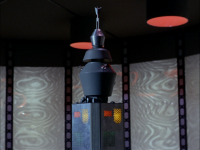
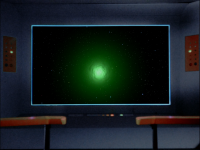

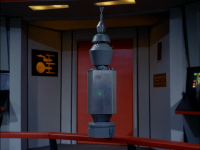
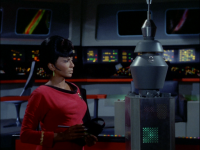
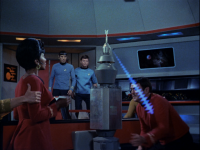
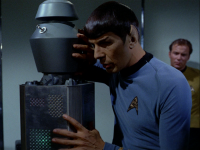
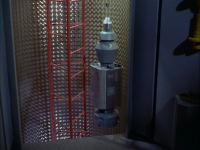
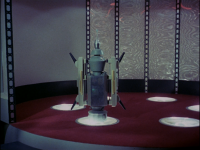
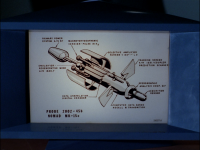
Star Trek TOS - 2x03 - The Changeling
Originally Aired: 1967-9-29
Synopsis:
The Enterprise encounters a probe named Nomad. [Blu-ray] [DVD]
Filler Quotient:
3, bad filler, totally skippable.
- Pretty lame episode with no significant long term continuity.
Problems
- In some scenes you can see the wire attached to Nomad to make it appear to float.
Factoids
- Several speed records are broken in this episode. Nomad's weapons travel at warp 15 and the Enterprise travels at warp 10.
- I operate a satirical Twitter account based on this episode. If you're interested, then follow Nomad on Twitter.
Remarkable Scenes
- Nomad thinking Kirk is its creator because he's from Earth and his last name is the same as the creator's.
- Nomad killing Scotty and wiping Uhura's memory.
- McCoy: "He's dead, Jim." Count 3.
- Spock: "That 'unit' is a woman." Nomad: "A mass of conflicting impulses."
- Nomad "repairing" Scott.
- Nomad enhancing the warp engines.
- Kirk talking Nomad to death.
My Review
This irritating episode is painful to watch and all too familiar. Once again Kirk talks a computer death, a feat made possible by the fact that, as I wrote in my review of Return of the Archons, "computers in the Star Trek universe have a tendency to be emotionally unstable and explode when they are sufficiently upset, contrary to how computers work in the real world." But that's not all, for there are any number of terrible aesthetic choices to pick on in this rather half-baked story. For starters, I find it hard to believe that the Enterprise could withstand even one blast, let alone four, equivalent to 90 photon torpedoes striking the ship at warp 15, or ~3375 times the speed of light. Then there's Spock's silly mind meld with Nomad. How was that supposed to even work exactly? What's next, Spock mind melding with the ship's computer to make course corrections? All of this to the backdrop of listening to Nomad irrelevantly restate its name over and over again and utter prominent examples of eloquent phrasing such as, "Non sequitur. Your facts are uncoordinated."
For a prop as awkward and unthreatening as Nomad was, it was nevertheless just filled to the brim with overwrought capabilities. In addition to the excessive weaponry, it managed to kill Scotty and then bring him back to life, fly through forcefields, vaporize a number of security personnel, and wipe Uhura's memory. The plot point about Uhura losing all of her knowledge and needing to be "reeducated" is perhaps the most annoying part of the story. In a single day she goes from an elementary school level of knowledge back to college level. For us to swallow this fact, we have to assume that Nomad didn't really wipe her memory at all. Instead, it must have caused her to experience some kind of amnesia. The knowledge must have still been there, but rendered difficult for Uhura to access. Or at least I hope this is the case because if it isn't then the whole thing becomes very difficult to explain very quickly. Not to mention the fact that the crew seems to have little regard for the possibility that Uhura may have forgotten everything about her personal life.
But poor aesthetics are nothing new on Star Trek. Perhaps the most unforgivable aspect of the story is the recklessness with which Kirk and Spock treat Nomad in the first place. At the beginning of the story, Nomad starts firing extremely powerful weapons at the ship. Kirk barely manages to convince it to stop and Nomad offers to visit the ship. From this moment forward, Nomad was vulnerable. At any moment Kirk could have used the transporter to destroy Nomad, as I'm pretty sure a device capable of dematerializing something and then rematerializing it elsewhere is capable of permanently dematerializing something and never rematerializing it. But we can rationalize that oversight quite simply by saying that Nomad's defense screens would not have permitted this, in spite of the fact that Kirk and Spock never tried. The issue of recklessness crosses into unforgivable territory shortly before the mind meld scene. Kirk explicitly convinced Nomad to lower its screens to allow Spock to mind meld with it. Why not phaser the damn thing out of existence as soon as it did so? Who cares where it came from and why it got this way? Kirk's and Spock's reckless scientific curiosity cost the lives of several crewmen and nearly the entire ship.
All things considered despite the value and originality of a story about a space probe encountering something dangerously unexpected and its mission being corrupted beyond repair, the story's promising potential is drowned out by an onslaught of bad storytelling which is becoming all too common on Star Trek by this point.
The following are comments submitted by my readers.
- From Orion Pimpdaddy on 2010-04-05 at 8:28pm:
I like this episode because it has a traditional robot instead of an android. I also like the cold responses the robot gave: "Non-sequitur," "insufficient response," etc.
The biggest letdown while watching this episode is the whole "Uhura's brain got erased" subplot. How absurd is it to think that Nurse Chapel is going to reteach Uhura EVERYTHING, and she's going to do it just in time for the next episode. How is Uhura going to perform her duties on the bridge if she can't even pronounce the word "blue"? What a joke! - From Jadzia Guinan Smith on 2010-09-10 at 2:59am:
Pimpdaddy is right (now there's a statement I never would have imagined myself making)!
It's totally absurd to think Uhura will just be "re-educated" to be a fullly functional starfleet officer. But even if we can make peace with the idea that she'll somehow learn all the job-related functions (she's an astronaut, so she probably started out a with a pretty good brain, right? Stay with me, my fellow retconners)... but how is she supposed to resume her LIFE without any personal memories? What about her family, friends, memories of growing up, etc.? Somebody should look for instances in subsequent episodes where she refers to things she should not be able to recall.
You know, if this were TNG, you can be sure that Dr. Crusher and/or Data would have found a way to "restore" her original brain contents by the end of the episode :-) - From Alex on 2012-05-24 at 12:08am:
I thought this was a 7. In the 2nd tier of shows in the second season. Nomad and how its purpose changed is excellent. That main plot was great. Erasing the brain was cool, but the reeducation was unbelieveable even for star date 4,000. - From warpfactor 10.1 on 2012-09-19 at 10:14pm:
It seems clear on even the most cursory of inspections that Nomad started life as a patio heater. There are several of these 'units' in the garden of the pub near where I live and I tried to destroy them in the way that Kirk destroyed Nomad but they outwitted me by ignoring me completely. They did however have an off switch on the side.
Pity about the sub-plot with Uhura which was pointless and had so many holes in it. - From Jasper on 2013-11-03 at 10:17am:
This episode does, however, invalidate a recent popular memegif: Scotty was *not* the only redshirt never to be killed. He just got resurrected when he did.
I would imagine, watching it at the time, if you'd noticed the redshirt tendency, his death might have had some impact for the original audience that it doesn't for the watchers today. - From Chris Long on 2017-11-18 at 10:24pm:
The biggest problem with Uhura's memory wipe aside from everyone else's complaints was that she was fluent in Swahili. I'm kind of surprised that no one else mentioned this little bit of idiocy. - From ChristopherA on 2021-01-17 at 5:38am:
I totally agree with you and everyone else here that Uhura losing her memory is completely ridiculous in terms of continuity. The issue is blatant enough to detract from the quality of the episode, it is just weird that there are no further consequences for this. Still, it is just a continuity error, not a flaw with the internal logic of the episode.
I agree it is really confusing stating that nomad’s attacks have the power of 90 photon torpedoes and then showing the Enterprise surviving hits from them. While the statement is pretty silly and does strain your suspension of disbelief, it isn't impossible to make up an explanation for this. It could be they have 90 times the energy of a photon torpedo without being 90 times as effective as a weapon, in that photon torpedoes are likely specifically designed to expend their energy in the most effective way to penetrate shields and damage a starship, while Nomad may have never fought a starship and may simply be shooting huge bolts that waste most of their energy on empty space. For instance, a speeding car can have 90 times the energy of a bullet without being 90 times as lethal.
You didn't mention the point that is even more weird, which is that the Enterprise survives an attack as powerful as 90 photon torpedoes, then complains when Nomad absorbs the energy from ONE photon torpedo by saying it is impossible to withstand a photon torpedo blast. Huh? I can make up an explanation for this by saying that the Federation knows how to build ships which can “survive” photon torpedoes with only shield damage, but has no idea how to build something that can “absorb” the power of a photon torpedo with no visible effect at all.
If Spock can mind meld with a silicon based lifeform with some sort of weird silicon based brain, it isn't totally impossible that he could mind meld with something that used to be a computer but has now evolved into something new and different. Still, I would agree that in terms of continuity it is rather odd that you can establish telepathic contact with Nomad but not with Data. But since they never explain how telepathic powers are supposed to work, it just ends up being that they work on whatever the writer wants them to work on, but they consistently don't work on any sort of sentient computer built with technology available to the Federation.
I don't agree at all that Nomad is vulnerable when it is inside the Enterprise, the opposite is true, it is our heroes who are more vulnerable. When Nomad is outside this ship the Enterprise can bring to bear enough firepower to sterilize the surface of an entire planet, and it still isn't enough to do anything. Inside the ship all they have are puny hand phasers and a transporter system which we know is easily defended against and has never been shown to simply dismantle starship-level threats. Whereas Nomad is still just as powerful inside the ship as outside and can easily destroy the Enterprise from within at any time. Even if it drops the force field that prevents Spock from establishing a mind meld, this is still a device that can absorb the entire energy of a photon torpedo into nothingness, a hand phaser is not a threat. And even if it is possible that, despite all of Nomad’s ludicrous powers, Kirk could find some weapon that it doesn’t have mysterious defenses against, you can't really fault that he made a command decision not to risk the instant destruction of his ship by continuing to antagonize it with attacks, and took on a different approach which ultimately worked.
While this isn't particularly my favorite episode and has some flaws, I don't think it is a particularly bad episode either, I liked the drama and how they slowly figured out what it was and how to deal with it. It is played out in a hammy and over-the-top way, but that is part of the charm of the original series.
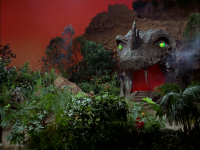
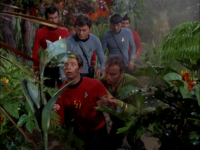
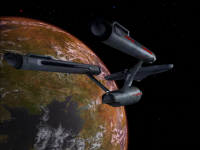
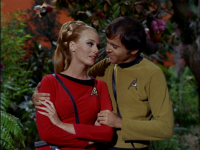
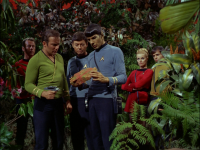
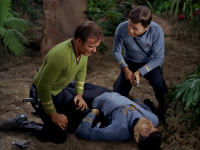
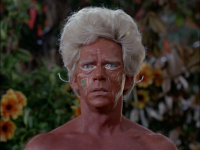
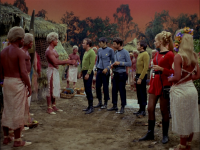
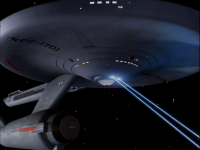
Star Trek TOS - 2x05 - The Apple
Originally Aired: 1967-10-13
Synopsis:
The crew discovers a paradise controlled by computer. [Blu-ray] [DVD]
Filler Quotient:
3, bad filler, totally skippable.
- Pretty lame episode with no significant long term continuity.
Problems
- Despite the Enterprise being stated to be in a decaying orbit throughout the entire episode due to the pull of a tractor beam from the surface, at no point does any orbital shot reflect this.
Factoids
- According to Spock the Federation has invested ~122,200 units of whatever currency it uses in his training.
Remarkable Scenes
- Chekov claiming that the Garden of Eden was just outside Moscow.
- Spock's exploding rocks.
- Kirk: "A Garden of Eden with landmines!"
- Spock getting shot by thorns to save Kirk.
- Spock getting zapped by a forcefield.
- McCoy regarding the forbidding of sex on this world: "Well there goes paradise."
- Spock getting struck by lightning.
My Review
An episode filled with another round of cliches such as more evil flowers with poisonous pollen, another society controlled by an evil computer which must be destroyed, and more cheesy comedy, especially the awkward Spock-the-sex-ed-teacher scene. On top of the cliches this episode breaks new ground on the poor choices front by making Kirk uncharacteristically second guess his decisions constantly and worry repeatedly about endangering his crew. Meanwhile the plot simultaneously makes him look like an idiot for not coming to the conclusion that they should just phaser the evil computer from orbit sooner. Though at least they blew it up rather than talk it to death this time.
While Kirk was having an off day, Spock sure got a chance to shine. In the space of a single day Spock survived two separate assaults that both by themselves killed a member of the landing party. By this point there can be no doubt that if you join Starfleet and your uniform is red then you are more likely to die with statistical significance. Since Spock's shirt is blue he must be immortal.
What little intrigue this story has to offer is tied to the potential for a moral dilemma with regards to destroying this society's paradise so that Kirk can save his ship. But the trouble is since there's no actual choice in the matter there is nothing to weigh. Given the choice between survival and violating the Prime Directive there is no choice so the whole debate is useless.
Nevertheless they seem to want to debate it anyway with Kirk and McCoy arrogantly trampling all over Spock's argument with rhetoric that amounts to little more than, "Who cares! Our culture is superior! They should live like us!" All the while glossing over the fact that however sedated the alien culture may have seemed, they were happy, sustainable, and for all intents and purpose immortal before Kirk showed up and ruined their happy little lives. All this to the backdrop of a plethora of annoying Bible references, as if we're supposed to believe that Christianity somehow dominates 23rd century Federation culture as much as it dominates 1960s American culture. Oh well. There have certainly been worse episodes.
The following are comments submitted by my readers.
- From J. Poole on 2006-04-20 at 5:43pm:
This is an episode that I remembered fondly from my childhood, but it stood out as one of the worst when I watched the series again recently on dvd (God bless Netflix).
For the most part, I agree with the review of this episode featured on this site--the problems with the prime directive, the mass murder of the redshirts, etc. are all indicitive of bad TOS episodes. I don't buy McCoy's arrogance when he's debating with Spock about saving these people from their idyll, but I guess you can ultimately justify breaking the Prime Directive because the ship was in danger.
That aside, though, there are still some real problems with this episode, namely the cliched aliens du jour and the "nothing can kill Spock" attitude this episode takes toward the first officer.
The aliens (aside from looking silly with their flowers and make up and spray-on tans) are ridiculous. I like the idea of their "Eden," even if it is a bit over-used, but I just don't buy these guys. And why, why, why does the Enterprise have orders to contact them just because of "strange readings?" This episode tramples on the Prime Directive from the very beginning. And you'd think that the crew would have learned to stay away from alien flowers by now.
The problem with Spock bothers me as well. I realize that he's physiologically different--stronger, able to mentally heal himself, etc.--but he should have died twice in this episode. I can buy the spore-thorns not killing him because of his different physiology, but a lightning strick capable of not only killing but actually vaporizing a red shirt ensign simply gives him some second-degree burns that are never mentioned again. Give me a break.
This episode is a real candidate for my personal "Worst Of" list. The only thing that saves it for me is Spock's analysis after the Feeders of Vaal try to kill the crew: if McCoy was worried about their stagnation, their lack of humanity, he need worry no longer because they have now taken a vital step by learning to kill. - From Arianwen on 2010-07-26 at 11:43pm:
Gentlemen/women/variations thereupon, I submit to you one Yeoman Martha Landon, who wears a short dress, is in love with one of the crewmen and shows concern for the natives' well-being. And flattens large, muscular men. Twice.
This is only the third time I remember seeing a woman take physical action against another person and succeed - without screaming. One of the redeeming features of this episode.
I agree with your review - the story is annoying and has many flaws. But it had potential, and with better handling (and laying off Spock for a few minutes) it might have turned out very well. I quite liked the natives - not the hippiness, but the physical portrayal, the facepaints (but don't look too hard at the hairstyles). It would have been more interesting if they had found out just what that machine was, rather than just destroying it and strolling off happily. Although I have a feeling it would have resulted in Kirk talking yet another computer into oblivion. The man is a menace. - From jd_juggler on 2015-03-22 at 4:09pm:
No, the saving of one's ship is not a justification for violating the Prime Directive. In one of the Captains Log entries from "The Omega Glory" Kirk notes that the prime directive even includes sacrificing the entire crew rather than interfere with the native culture. By the way, remember the redshirt who tripped on a rock and was blown up? The stuntman was severely injured and in fact was hospitalized. - From Chris on 2018-01-14 at 10:50pm:
This episode bugged me for a lot of reasons and I wonder how Nichelle Nicols felt when Roddenberry (or whoever) described the natives in this episode. Tanned, blonde, muscular surfer looking types, you know typical good-looking folks.
I was often fascinated how Star Trek portrayed the good/innocent inhabitants of various worlds... like the Yangs or the Hill People of Neural. All white and good looking with goofy hairdos.
Considering that Roddenberry was an atheist, they sure used a lot of Bible references in their episodes!
Other problems with this episode aside from the ones mentioned are:
- Spock breaking the stone landmine without it going off in his hands!
- Spock being selected to give a sex-ed lesson when there is a perfectly good doctor on hand who is far more qualified on the subject. Especially human sex! Yes, I understand the 'humor' wouldn't work my way...
- McCoy continually unprepared to handle Vulcan physiology, continuously using human drugs on aliens.
There are numerous other problems as well...
I laughed at the 'argument' between Chekov and Spock! "Vhat do you vant, violins?
A factoid that should be listed is that Kirk establishes that the warp nacelles can be jettisoned from the main body of the ship! That's mentioned in another episode as well but I can't remember which... Later in Season 3, I believe.
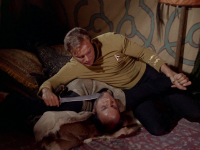
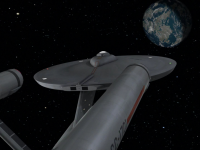
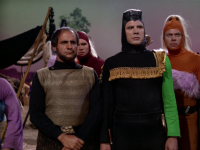
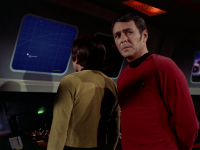
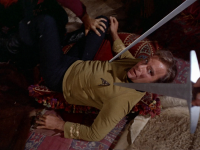
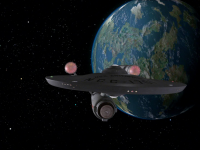
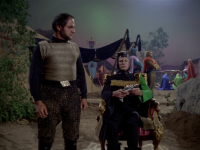
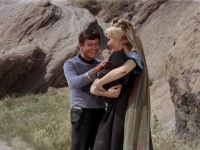
Star Trek TOS - 2x11 - Friday's Child
Originally Aired: 1967-12-1
Synopsis:
The Enterprise crew becomes embroiled in a local power struggle on a tribal planet. [Blu-ray] [DVD]
Filler Quotient:
3, bad filler, totally skippable.
- Pretty lame episode with no significant long term continuity.
Problems
- Responding to a distress call, Scotty orders the Enterprise to the distressed ship's location at warp 5. But the Enterprise's maximum speed is at least warp 7 or 8 from other episodes we've seen! I guess they're not in that much distress after all... Then to make matters worse, when he returned to the planet, he did so at warp 6, and made a big point about it! Yes, because when the captain's in trouble, it matters far more than the lives of potentially an entire freighter!
- When Kirk and Spock used their communicators to cause the rockslide, the special effects instead depicted the rocks exploding off the cliff as if they were rigged with explosives. Those must be some pretty potent sound waves...
- In the teaser when McCoy is briefing the senior officers on the aliens of the week, the footage shown of them battling is actually recycled material from later on in the episode when the warriors are hunting down the landing party.
Factoids
- This episode establishes that the maximum speed of a Federation freighter is warp 2.
Remarkable Scenes
- The security offer whipping out his phaser the moment he saw a Klingon and then getting instantly killed.
- Kirk currying favor with the new tribal leader by exposing fear in the Klingon and proposing that he be allowed to duel the Klingon.
- McCoy and Eleen slapping each other.
- McCoy: "I'm a doctor, not an escalator!" (Count #6 for "I'm a doctor, not a [blah]" style lines McCoy is famous for.)
- Kirk and Spock constructing and wielding bows and arrows.
My Review
An episode which on the surface seems nearly identical to Errand of Mercy. Once again we have a proxy battle between the Federation and the Klingon Empire and once again the aliens of the week being manipulated by this proxy fight are a primitive race which oddly appear identical to humans. The trouble is Errand of Mercy was a good story and this episode sucked.
In Errand of Mercy we're treated to the delightful character of Kor whose well characterized personality really drives home the philosophy of the Klingon Empire and how it differs from that of the Federation. But in this episode, the Klingon antagonist lacks intrigue or personality of any kind. He falls completely flat. This contrast is even reflected by the events in orbit of both episodes. In Errand of Mercy there's an exciting space battle in orbit. In this episode there is no action in space at all. Instead the Enterprise follows up on fake distress signals and chases away a timid, fearful Klingon ship, lacking in any kind of dramatic appeal whatsoever much like its Klingon counterpart on the surface.
On top of that the diplomacy in this episode is terrible in a couple of places. First and foremost, the entire premise of this episode is a blatant violation of the Prime Directive, again much like Errand of Mercy. Second, even if we assume that the Federation had made an exception to the Prime Directive due to the importance of securing the resources on this planet, that by no means gave Kirk the authorization to interfere with local law by saving Eleen, thereby endangering the mining rights negotiations as well as the lives of the landing party.
But it wasn't just Kirk who was off his game today because the bridge crew of the Enterprise started to look mighty stupid too by the end of the story. I'm glad that the overwhelming obviousness of the distress call being fake eventually occurred to Scotty, but the time for that was well before he turned the ship around. The most annoying scene on the bridge was when Uhura questioned Scotty's rather solid reasoning about the distress call being fake with little more than "but what if it's real?" That challenge alone convinces Scotty to keep plugging away at the useless search for a while longer, further endangering the landing party unnecessarily.
Probably the only charming aspect of the story was McCoy's high degree of competence, which was a nice relief from an episode filled with incompetence by nearly every other character. For reasons not terribly well explained McCoy seems to be an expert on this planet's culture and while on the surface he takes charge of the medical situation effectively and in ways allowing for a bit of decent humor as well which too was a nice relief from the overabundance of fistfights and tribal ritualistic nonsense the episode seemed to focus on to excess. Overall though this episode is quite a disappointment.
The following are comments submitted by my readers.
- From Orion Pimpdaddy on 2010-05-03 at 8:13pm:
I liked this episode a little. It is one of the rare episodes where Kirk spends a great deal of time regetting the loss of his fellow redshirted crewmember, the one who dies a minute after beaming down. He even chews out McCoy with his misplaced anger. Also, McCoy's semi-romance with the pregnant woman is interesting.
Eventually, the show falters as it shifts into cliche action sequences out in the rocks. This is the only time I know where a communicator is used to create an avalanche.
One more thing, there's something distrubing when you hear McCoy saying Ochie Woochie Koochi Koo; it's sounds dubbed. - From Peter Collins on 2015-03-18 at 2:34pm:
Pretty poor episode, but just one thing: isn't there a line about how McCoy spent some time on the planet getting to know the locals, which is how he has some in-depth knowledge? - From Rick on 2017-02-08 at 3:22am:
"On top of that the diplomacy in this episode is terrible in a couple of places. First and foremost, the entire premise of this episode is a blatant violation of the Prime Directive, again much like Errand of Mercy. Second, even if we assume that the Federation had made an exception to the Prime Directive due to the importance of securing the resources on this planet"
Eventually I assumed that you would figure out that the Prime Directive does not apply to worlds where the Klingons will conquer and destroy unless you intervene. The point of the Prime Directive is to allow worlds to develop naturally. If you have advance knowledge that a race (i.e. the Klingons) are going to conquer, use, and destroy a planet, then yes, you can intervene because the Klingons are going to intervene regardless of whether you do. Come on man. Stop being so uselessly hard on TOS. We all clearly realize that you dont like TOS in favor of the precious continuity of the much lesser DS9 and the like. - From Rick on 2017-02-08 at 3:53am:
In addition to the above, come on, give some credit to the ending. The antagonist of the entire episode finally comes to the realization that the Klingon that he has been supporting is in fact a fraud, and decides to sacrifice himself for the good of his people. That is the kind of antagonist I can get behind and the kind of one that makes a great episode. - From Chris on 2018-01-17 at 7:08pm:
I wasn't going to comment on this episode but feel the need to interject something re: The Prime Directive.
That regulation was blown out of the water at the episode's beginning with McCoy having already visiting the planet and learning about its people.
For that to have even been allowed to happen means that in earlier years, this planet had been visited and the natives already knew of aliens from the sky. They already knew about Federation weapons, communicators, etc...
I see no problem with the PD in this episode at all.
I do have a problem with Kirk's rationale that they violated no customs and so on! Is he high?!?Ridiculous for him to even go after Bones!
I always hate that TOS made the Klingons out to be such conniving sissies! - From Chris on 2019-02-09 at 10:56pm:
As usual... Another follow up.
I loved the interactions between McCoy and Eleen when slap each other! That S___ Eating grin on her face is priceless!
I also always like when Kirk baits Spock with "Well, if you don't think it'll work, maybe we shouldn't try..."
Did anyone else notice the Klingon falling down as they were approaching? They even kept the follow-up scene where he is recovering from his fall!
I'm consistently annoyed by their warp factor choices! The plague on New Makus when after Spock and the remains of the Galileo Seven get back on board, Kirk heads off at Warp 1! WTF?
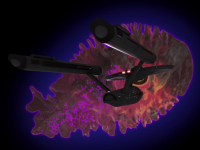
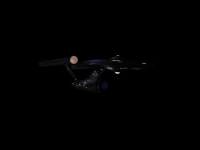
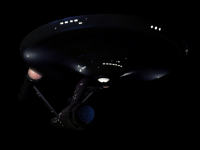
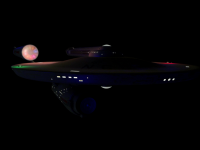
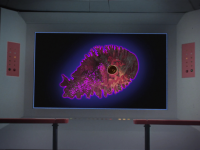
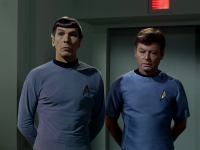
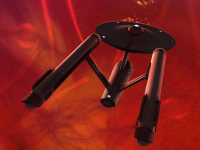
Star Trek TOS - 2x18 - The Immunity Syndrome
Originally Aired: 1968-1-19
Synopsis:
A giant space amoeba threatens the entire galaxy. [Blu-ray] [DVD]
Filler Quotient:
3, bad filler, totally skippable.
- Pretty lame episode with no significant long term continuity.
Problems
- Throughout the episode numerous characters make mention of the giant space amoeba threatening all the nearby "solar systems." This is a common error. The term they were looking for is planetary system. The planetary system we live in is called the Solar System because our star is named Sol. As such, the term "Solar System" is a proper noun, not a generic term.
- At several points during the episode the characters switch fluidly between the metric system and English Imperial Units for no discernible reason. Hardly scientific...
- Spock's explanation in this episode that Vulcan has never been conquered would seem to contradict McCoy's statement in The Conscience of the King where he stated in regards to Vulcan: "Now I know why they were conquered," in response to Spock's refusal to drink alcohol. However, I suspect McCoy's statement was hyperbole in reference to Vulcan's admittance to the Federation, an organization which appears to be run largely by humans.
Factoids
- This episode establishes that it is common for ships in the Federation to have a racial bias. For instance, the Enterprise has a mostly human crew, while the Intrepid has a mostly Vulcan crew.
- This episode establishes that Vulcan telepathy is powerful enough to sense the mass death of Vulcans across relatively great distances.
- According to Spock, Vulcan has never been conquered.
Remarkable Scenes
- Spock sensing the Intrepid's Vulcan crew dying before the ship's sensors could detect it.
- Kirk sending Spock on the suicide mission, much to McCoy's irritation.
- McCoy: "Shut up Spock! We're rescuing you!"
My Review
This episode is a rehash of The Doomsday Machine, but considerably less entertaining, mostly due to the fact that it's slower paced and lacks the subtleties, intrigue, and overall dramatic appeal that The Doomsday Machine had in spades. To fill the time, the episode is laced with useless filler scenes depicting Kirk making all hands announcements or log entries, despite the fact that they only have a short time before the ship is destroyed by the giant space amoeba. Likewise, the scenes with loud, high pitched sounds generated by probe telemetry certainly didn't help the episode's entertainment value either.
The only redeeming quality of the story is McCoy and Spock competing over which of the two shall go on the suicide mission. Their valor combined with their their posturing and mock(?) contempt for one another was rather amusing, although it isn't terribly well established why a probe or even the shuttle itself couldn't have been remote piloted into the center of the space amoeba to mitigate the danger. Likewise, the whole technobabble scene that rambled on about "anti-power" and "everything in reverse" so Kirk could conclude that they needed to detonate an antimatter bomb at the center of the space amoeba was unnecessarily incoherent.
Overall while this episode had some potential despite its unoriginality, it failed to deliver on most of it. What's left is a sombre, depressing, slow, and tired story with no subplots. It reminded me quite a bit of The Corbomite Maneuver for all the wrong reasons.
The following are comments submitted by my readers.
- From rhea on 2008-04-27 at 10:07pm:
True, in a lot of ways it is The Doomsday Machine II, but on the level of character interaction, we still learn something new. The captain is (all too briefly) in captain mode, deciding which of his friends to send to death. The inability of McCoy to wish Spock luck but being worried nonetheless is quite telling, more clearly defining their love-hate-relationship. Spock is remarkable in his stoic expectation of death. What annoyed me was that it was again Kirk who saved the Enterprise with the idea of the antibody and the antimatter bomb, when clearly Spock had the same idea before (but was unable to communicate it). Why not once give the credit to him? - From Orion Pimpdaddy on 2010-06-07 at 2:09am:
I just watched the Blu-Ray version and I thought they did a great job with the new visuals. They didn't do a complete redesign of the organism; they just show more detail. That's a good thing.
As far as my overall opinion of this episode, I'd say it's a good one. There's a lot of tension and drama. Spock embarks on a dangerous mission, Kirk has to make tough decisions, Scotty's having troubles with the ship, etc. I think we see real suffering with the crew, as opposed to manufactured suffering. - From Glenn239 on 2012-09-27 at 1:10pm:
A solid drama-based episode that is in the top 1/3rd. That it was a rehash of the Doomsday Machine speaks for it, not against it. Star Trek repacked everything and I'd rather it reprise its great moments than its weak ones. I find much of what is called 'character building' in the series to be exercises in piling onto pre-existing cliques. I'm much more interested in a story establishing an interesting premise to which the crew responds - like this one does – and then examining the relationships between each member along the way, only as is necessary to resolve the problem. Yes, we get it. McCoy backbites Spock every chance he gets and Kirk and Spock are secretly in love or whatever. Now, can we please go phaser the Klingons? That’s why this episode is a ‘9’; good premise, good resolution, and good character interaction along the way. - From Chris on 2018-08-15 at 5:22am:
What I hate about this episode is...
- When they clearly went into the 'dark zone' and Kirk is mystified as to where the stars went! What????
- McCoy might have survived if he'd been wearing a helmet and a seatbelt!
- Spock's clearly smug attitude towards McCoy about superior whatever... abilities...
I do think that Kirk just took a key from Spock's last transmission and figured out what he was trying to say. I don't think he came up with it on his own.
I liked the McCoy-Spock interactions and thought that part was excellently done! ... for the most part.
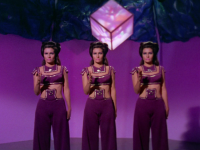
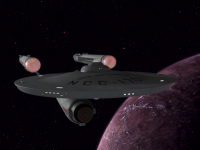
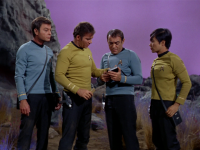
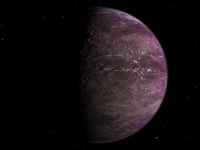
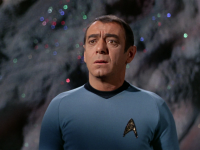
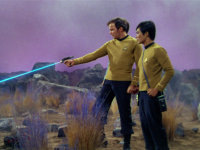
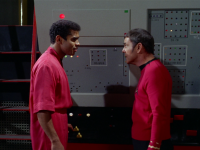
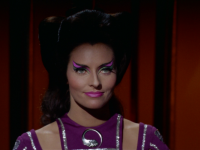
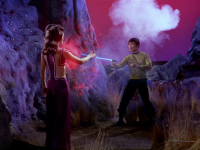
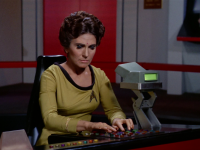
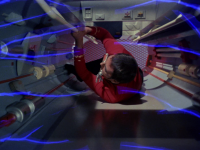
Star Trek TOS - 3x17 - That Which Survives
Originally Aired: 1969-1-24
Synopsis:
A deadly computer image protects a long dead outpost. [Blu-ray] [DVD]
Filler Quotient:
3, bad filler, totally skippable.
- Pretty lame episode with no significant long term continuity.
Problems
- Warp 14.1 (the maximum speed the Enterprise travels during this episode) is nowhere near fast enough for the Enterprise to travel 1000 light years in a single day. Even at warp 15 (~3375 times the speed of light), it still would have taken the Enterprise months to travel 1000 light years.
- The lieutenant at the helm measures the time it will take to arrive at the planet in "solar hours." What the hell is a solar hour?
Factoids
- The Enterprise travels at its fastest (natural) speed ever: warp 14.1.
Remarkable Scenes
- Uhura: "What happened?" Spock: "The occipital area of my head seems to have impacted with the arm of the chair." Uhura: "No, Mr. Spock, I meant what happened to us?"
- Kirk: "Mr. Sulu, if I wanted a Russian history lesson, I'd have brought along Mr. Chekov."
- Spock and Scotty's silly scenes.
- Sulu: "Terrible way to die." Kirk: "There are no good ways."
- Losira withstanding Sulu's phaser blasts as if they weren't there.
- Spock: "Beauty is transitory, doctor."
My Review
A planet even Spock can't explain! I giggled at such an amusingly goofy opening line and I enjoyed the scientific paradoxes presented by the planet. It's only a few thousand years old and the size of Earth's moon, and yet it has vegetation, significant atmosphere, and Earth-like gravity. Much like the mystery of the scientifically implausible planet, Scotty's near-suicide mission and the landing party's terrific command of survival skills in the sudden absence of the Enterprise were nicely done. I also was struck by how cranky Spock was all episode. I've never seen him so difficult to get along with!
The explanation that the planet was artificially created reasonably explains away all the paradoxes, but the story about the people who created it totally fails to deliver. As Losira slowly starts killing people, her inability to communicate anything resembling a motive gets more and more frustrating. In what is perhaps the longest Star Trek has ever dragged out establishing a character motive, Losira's motives only become apparent in the very last scene of the episode.
At the end we learn that her people, who are yet another alien race that looks exactly like humans, died out due to a disease they accidentally unleashed on themselves while creating that planet. The image of Losira attacking people was due to a computerized defense mechanism that was set to auto attack anyone in the vicinity not of Losira's people. Somehow Losira's personality was fused into the computer before she died, which explains her ambivalence to all the killing she did. The end of the story gave us a motive, but not a reason to care, resulting in quite a flop.
The following are comments submitted by my readers.
- From TashaFan on 2008-09-19 at 1:46am:
Another thing I noticed about this is how at the very end Spock shows up with one Redshirt(tm) and one quick phaser shot destroys the computer that was creating the artificial women. (Although it continues to spin in crazy patterns, just more slowly). An awfully quick solution so the danger certainly seems to have been manufactured and then conveniently disposed of once it's time to end the episode, I quite agree. So here's another supercomputer destroyed. But shouldn't Kirk have argued it to death? - From Arianwen on 2010-09-01 at 10:45pm:
Another remarkable scene - or rather sequence - from this episode: Scotty's time in the crawlway. The tension it generates is palpable and the final moments, when he's panicking over the magnetic probe ("it's stuck!") are pure gold. It feels very real; on the whole, a great episode for Scotty.
Also good to see a female goldshirt actually being efficient on the flight-deck, and doing her job, her whole job and nothing but her job. (With a little bit of panicking to keep the crew company.) - From Strider on 2012-07-01 at 4:48am:
I was also very excited to see the female navigator! That actor was also one of the Native American women from "The Paradise Syndrome." While she was portrayed as a competent helmsman, you could also see that she was new to bridge duty and probably to working with Spock, because she makes a few mistakes that a person used to this dirty wouldn't have made. Though it's true tat ST has a mixed record in portraying women, I found these details to be realistic and not necessarily based on Radha's gender.
I liked how big a role D'Amato played before his (inevitable) death--he really seemed to fit into the landing party, like he'd been with them before. And he got to offer some real expertise in his field, as well. Unlike all the doomed redshirts, I was sorry to see D'Amato go. He'd have been a good addition to the supporting cast. The actor who played him, Arthur Batanides, became a very accomplished television actor.
Spock is awfully "Spocky" in this episode, isn't he? None of the irritated humor of "The Mark of Gideon," and none of the stress we usually see when he's worried about Kirk. However, it's my observation that the more deeply Spock feels emotions, the more Vulcan he becomes in response. Also, in this episode, he has what's essentially a science problem to solve, and that's what he's best at.
Lots of good Scotty scenes in this episode as well. I loved when Scotty had just saved the ship against all odds (again) and Spock starts lecturing him on humans' need for gratitude, and Scotty just collapses in the crawlway in relief.
Otherwise this episode's plot is weak, and the disco ball/cube computer corny. And I wanted Spock to tell Kirk, "Dude, we got the Enterprise up to warp 14.1! It was AWESOME!" - From Alan Feldman on 2014-03-27 at 2:07am:
"THAT WHICH SURVIVES"
A solar hour is 1/24th of a solar day. A solar day is how long it takes the earth to rotate once relative to the sun. (Note that a sidereal day is how long it takes for the earth to rotate once relative to the fixed stars, which is about 23h56m. Since the earth has moved about 1 degree in its orbit over that time, the sun appears in a different place, and it takes about 4 extra minutes for the earth to rotate that additional degree.)
So a solar day is 24 hours long.
On a starship carrying humans it makes sense to emulate 24-hour days. In "The Conscience of the King" Kirk even says that's what they do. Hence, solar days on Star Trek.
I like the scene where Scotty saves the ship. But why doesn't Spock say thank you? He says that in other episodes. Anyway, it works here, so that's good.
Yeah, lame episode. What's the point of custom killer women who all look exactly the same? And the light-show computer? Bizarre.
What's with that additional piece of Miss America's costume covering up her belly button? Looks silly. It's purpose is just so blatantly obvious. Didn't we see Nichelle Nichols' navel in "Mirror, Mirror"? And Nancy Kovack's (Nona) in "A Private Little War"?
AEF, a.k.a. betaneptune
- From jeffenator98 on 2019-05-06 at 5:38pm:
Why didn't she have to say "I'm for you transporter room guy"?
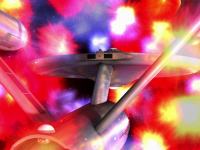
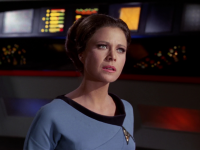
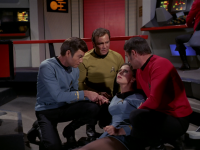
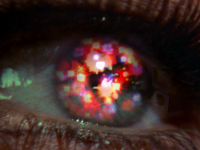
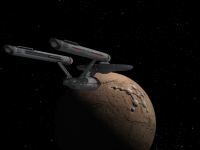
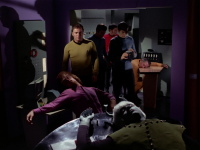
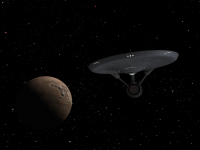
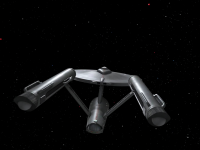
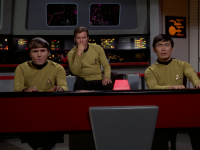
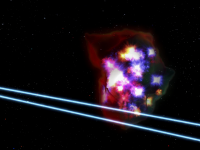
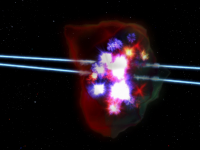
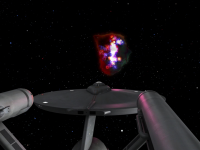
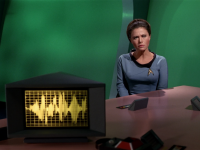
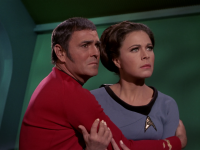
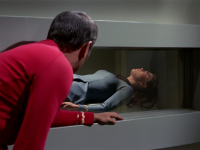
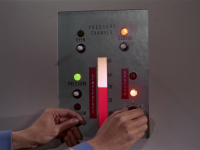
Star Trek TOS - 3x18 - The Lights of Zetar
Originally Aired: 1969-1-31
Synopsis:
Zetarians threaten Lieutenant Mira Romaine. [Blu-ray] [DVD]
Filler Quotient:
3, bad filler, totally skippable.
- Pretty lame episode with no significant long term continuity.
Problems
- Kirk claims no natural phenomenon can travel faster than the speed of light. What about tachyons?
- When the landing party reaches Memory Alpha, they complain about having beamed into darkness. But the room is actually quite well illuminated!
Factoids
- This episode confirms the figure from The Mark of Gideon that there are 430 people aboard the Enterprise at this time.
Remarkable Scenes
- Nurse Chapel making fun of Scotty.
- Kirk's impatience with Scotty's behavior.
- Kirk sticking Mira in the pressure chamber of doom.
My Review
Poor Scotty. He's such a terrific character, but for some reason episodes revolving around him always seem to suck. He and Mira were just insufferable together which wasn't helped by the fact that the show kept intercutting their boring scenes with the crisis situation. The climax of absurdity is Kirk calling a long conference room meeting in the middle of the ship being attacked by the entities in order to slowly and verbosely determine their next move. Kirk occasionally called the bridge to check in with Sulu and to make sure they weren't all seconds from destruction, but that doesn't really save it.
Likewise Kirk's reasoning for why he chose to toss Mira in the pressure chamber to kill the entities was terribly opaque. We have no idea exactly why Kirk thought the pressure chamber was the best move or why he thought it would even work in the first place. For all we know he was just guessing. Another area of opaque reasoning was Spock's rather hasty conclusion that the lights were an alien attack and not a natural phenomenon. Although perhaps by this point in the series Spock is as cynical as we are about the repetitive nature of the plots.
The concept of Memory Alpha as a central repository for all Federation knowledge is also a bit puzzling. Why would only one colony possess all the knowledge of the Federation? Computer data is easily copied. Why not maintain a number of these public space libraries, e.g. Memory Beta, Memory Gamma, Memory Delta, etc. Likewise since the galaxy appears to be filled with any number of hostile aliens, why not equip these crucial facilities with better defenses? At least Kirk seemed irritated with the fact that Memory Alpha lacked shields though.
The only part of the story with any real merit was the philosophy articulated by Kirk's line to the aliens, "the price of your survival is too high." He goes on to say that they are entitled to their own lives, but not that of others. In this short, but profound line Kirk articulates the philosophy of Star Trek quite eloquently. The Federation respects all life, but sometimes despite that respect for life you have to kill in order to survive. A better episode would have wrestled with the ethical implications of killing one sentient being to save another a bit more, but alas, this story lacked sufficient nuances to really do that.
The following are comments submitted by my readers.
- From Lt. Fitz on 2012-06-20 at 8:24pm:
Horrible episode. I had to watch it like 5 times to get through it without falling asleep. Even the actors looked bored. It looked like Kirk was falling asleep in the conference room. I still don't know why they figured that putting her in a pressure cooker would solve the problem of alien possession. And, what were those pressure cookers for, anyway? They use replicators for food. Thank goodness those otherwise useless devices were put on the ship.
- Kirk's intense whisper: "Pressure, Spock. Pressure." And, then: "Pressure."
- Bones: "The pressure's dangerously high, Captain!" Good writing. Glad that he said that to remind the audience that there is a threat in this snoozer of a plot.
- Spock: "We may tax Mr. Scott's patience, Doctor." That's OK. He's been taxing my patience the entire episode. - From James Ingalls on 2014-11-12 at 9:55pm:
What happened to the great screencaps in these last few episodes? - From Kethinov on 2014-11-13 at 5:41am:
This was the last episode I could get to before other projects unrelated to this site began consuming my time.
I actually do have a complete set of new 1080p screenshots to post for the rest of TOS and all the films, but I just haven't gotten around to putting them up yet.
Stay tuned, it will come! That, and a brand new completely updated design for this entire site is in the pipeline. :) - From jd_juggler on 2015-03-22 at 3:14pm:
Phasers are fired into the entity and Mira collapses in pain. Scotty reports to the bridge that just one more such shot would kill Mira. Kirk seems to believe this without question, without even any medical examination. Yet, having heard all this, Sulu STILL says "phasers ready for firing". At this point I usually audibly mutter at Sulu "you cold-hearted bastard!"
The aliens certainly must realize that putting Mira into that pressure chamber was an attempt to destroy them. So why didn't they leave Mira's body? The inhabitants of memory alpha were all killed; how did the crew of the enterprise escape this fate? - From Chris on 2019-01-13 at 2:13am:
If you ask me! ... and you didn't this episode just pissed me off from start to finish with Scott's insufferable attention to Mira at the expense of everyone else!!!
Starship Officers are allowed to act this way? EVER?!?!
Aside from the absolute nonsense bitched about in the other reviews, this episode was close to vomit inducing for me!
Hey! What happened to Karyn! - From Chris on 2019-01-17 at 2:00am:
If you ask me! ... and you didn't this episode just pissed me off from start to finish with Scott's insufferable attention to Mira at the expense of everyone else!!!
Starship Officers are allowed to act this way? EVER?!?!
Aside from the absolute nonsense bitched about in the other reviews, this episode was close to vomit inducing for me!
Hey! What happened to Karyn! - From Anan8 on 2020-10-18 at 2:03pm:
Take it easy on the "data is easily copied" comment. I was alive in 1966 and it was not easy to copy data, nor cheap. They may not have realized that some day we would have memory sticks and online data storage. We didn't even have good copiers until the '80s. Before that we used what was called a Mimeograph machine. Loved the smell, but they were a mess.
I never understood why the Zetarians just didn't escape the pressure chamber and move on. They easily penetrated the hull. Maybe they should have made the hull out of the material they made the pressure chamber.
And I can't figure out why they make Scotty look like a bumbling 7th grader when he's featured in an episode with women.

Star Trek TOS - 3x19 - Requiem for Methuselah
Originally Aired: 1969-2-14
Synopsis:
Kirk and crew meet an immortal human named Flint. [Blu-ray] [DVD]
Problems
None
Factoids
None
Remarkable Scenes
- Rayna: "What is loneliness?" Flint: "It is thirst. It is a flower dying in the desert."
- Kirk dancing with Rayna while Spock plays the piano.
- Kirk criticizing his own actions in the end.
- Spock mind melding with the sleeping Kirk, forcing him to forget the whole experience.
My Review
This episode would have been better if it focused more on the plague and less on this mysterious human who's claimed his own planet. The absolute worst detail in this episode is Kirk falling in love with yet another girl of the week. He should have just left Flint alone and left the planet once he had his medicine.
The following are comments submitted by my readers.
- From Crystal on 2012-06-19 at 1:55pm:
I am not sure why Spock felt the need to make him forget this girl of the week, and not Edith or Elaan.
I agree that there should have been more focus on the plague, since it threatened the entire crew of the Enterprise. - From jd_juggler on 2015-03-28 at 4:41pm:
Arguably the worst episode of the entire series. Shatner's acting, and the inane dialogue is almost painful to watch, especially when he is "falling in love" with an android. And we know what most of those historic characters Flint claims to have been looked like. And they didn't all look alike. And if we are to suppose that none of those famous people actually died, they all must have simply "disappeared" - again, not credible. Nor would any of them (except his first incarnation) have had a childhood. - From Harrison on 2015-11-22 at 6:22pm:
While there is a fair bit of appalling acting, this episode has some redeeming and memorable virtues. For one thing, Nemoy delivers a very strong performance Spock's revelation of Flint's genius and past identities unfolds exactly as it should, thanks o some pretty elegant dialogue. James Daly is quite convincing as the inscrutable Flint. Louise Sorel is not only drop-dead gorgeous, but delivers some undeniably entrancing lines ("It is a flower dying in the desert"). Even Kirk's philandering campiness doesn't entirely lack amusement value. There's some classic Star trek to be had here, adn ti certainly isn't the worst episode of the original series.

Star Trek TAS - 1x15 - The Eye of the Beholder
Originally Aired: 1974-1-5
Synopsis:
The disappearance of a scientific team lures the Enterprise to investigate near Lactra VII. [Blu-ray] [DVD]
Problems
- At one point, the star symbol in the uniforms was placed onto the wrong side.
Factoids
None
Remarkable Scenes
- McCoy being crushed by the giant dinosaur monster.
- Scotty accidentally beaming up the young alien.
My Review
Another episode demonstrating the power of illusions. Another superior alien species using the cast for their own amusement. The only redeeming feature of this episode is the unique qualities of the aliens of the week. Granted, it's extremely cliched to have yet another super superior alien species; if there are so many alien species that are vastly superior to the Federation, then why is the Federation (and the Klingon and Romulan Empires for that matter) able to dominate so much space? Finally, it seems unlikely that such an advanced species wouldn't know their pets are sentient lifeforms.
The following are comments submitted by my readers.
- From TashaFan on 2008-09-13 at 6:25pm:
You ask how can there be so many superior aliens while the Federation appears to dominate so much space. I think the superior lifeforms largely ignore us. For example, we think of ourselves as vastly superior to ants. To the ants, it may seem that they dominate everywhere. Only when the ants become an annoyance do we go out and poison them. They see our houses and may try to get some food and as long as we don't notice they are left alone. But once we see them marching across the kitchen out come the baits and the anthill gets poison poured down it. And of course our kids might burn a few ants with a magnifying glass now and then. Just like the occasional Trelayne toying with the Enterprise crew. In the meantime, there are still millions of ants living everywhere that we live. Do they dominate the space? Do we?

Problems
- How are Bem's body parts able to float?
Factoids
- This is the first episode to mention Kirk's middle name, Tiberius. (Four times even.)
Remarkable Scenes
- Kirk and Spock being beamed into midair, then falling into the water below.
- Kirk regarding being captured: "How come we always end up like this?"
My Review
This episode is remarkable in that it once again takes full advantage of the show being of an animated nature. It shows us truly alien aliens; first Bem, then the natives on the planet. Unfortunately very little of interest actually happens in this episode. It's basically the familiar "cast beams down to primitive planet and gets captured" plot, adding nothing new except Bem the pacifist, who adds very little of value to the plot. While I liked our truly alien aliens, they were completely misused.
The following are comments submitted by my readers.
- From Terry A. Hurlbut on 2016-07-15 at 10:19pm:
Alan Dean Foster, who adapted all the animated episodes to prose, realized the one redeeming value of this particular episode. He expanded on the Bem narrative--greatly. In his version, the Enterprise travels to Pandro (Bem's home world), where Bem and Captain Kirk both have to stretch themselves to the limit to deal with a uniquely Pandronian crisis. (See "Star Trek Long Nine," New York: Del Rey Books, 1977.)

Star Trek TAS - 2x05 - How Sharper Than a Serpent's Tooth
Originally Aired: 1974-10-5
Synopsis:
While tracking a probe, the Enterprise encounters an alien vessel that is surrounded by an energy field which proceeds to encompass the Federation ship. [Blu-ray] [DVD]
Problems
None
Factoids
- This episode's title is from Shakespeare's King Lear, Act I, Scene 4.
- Sulu is remarkably absent from this episode. Replaced by Walking Bear because they conveniently needed a Native American in this episode.
Remarkable Scenes
- Kirk telling the Native American god "we don't need you anymore."
- Spock: "Vulcan was visited by alien beings. They left much wiser."
- Kirk: "How sharper than a serpent's tooth it is to have a thankless child."
My Review
The addition of Ensign Walking Bear is bittersweet. On one hand, it's nice to see more racial diversity on the show. On the other hand, the character was entirely forced. He only appears on this episode, and only because they needed a native American for the purpose of the plot. This is already a cliche, several guest characters are added in various Star Trek series just for one episode to serve some overly simplistic purpose and we never see them again. Once again, the Enterprise encounters another space traveler who once visited Earth and posed as a god, which is also becoming a cliche. Unfortunately, the entire plot was recycled and offers absolutely nothing new. God alien realizes Earth isn't as primitive as it once was. God alien realizes it's not as powerful as it once was. The only redeeming quality is the episode once again features alien looking aliens.
No fan commentary yet.

Star Trek TNG - 1x04 - Code of Honor
Originally Aired: 1987-10-12
Synopsis:
Tasha is kidnapped. [DVD]
Filler Quotient:
3, bad filler, totally skippable.
- There is some stuff here which foreshadows Wesley's more prominent role as a member of the crew later, but none of it is essential viewing.
Problems
None
Factoids
- It is heavily implied that the Ligonians use the same transporters as TOS. Even the effects are similar.
Remarkable Scenes
- Data correcting Picard regarding what century the gift originates from.
- Picard's irritation with Beverly wanting to discuss Wesley.
- Picard giving Wesley a chance. "Sir?" then, "Sir?" then Picard says, "Is the whole ship deaf?"
- Data offending Picard when discussing the French language.
- Riker being carefully talked into agreeing that Picard should lead the away team.
- Picard rambling on "about something everybody already knows."
My Review
There is a decent idea for a story about diplomacy here, but it's buried beneath a lot of bad stylistic choices. It's pretty hard not to see the Ligonians as racist stereotyping and the conflict surrounding Yar as sexist stereotyping, particularly the scene where Data described the weapons as so light that even women could use them. Some smaller stylistic choices were awkward too, such as Data of all people tripping over his words with the "includling" line; a vocal mistake that is hard to suspend disbelief on, Beverly's unprofessional panicking about the vaccine, and a series of scenes with stilted dialog that the actors were clearly stumbling over. While the episode does have a few nice details and a few amusing scenes, what we have here is unfortunately mostly cringeworthy.
The following are comments submitted by my readers.
- From DSOmo on 2007-05-27 at 7:49am:
- While presenting Lutan with the horse statue, Picard says that he is aware of the Ligonian culture's unique similarity to an ancient Earth culture that he "admires." However, later in the episode, Picard states that the customs of the Ligonian culture are the "same kind of pompous strutting charades that endangered our own species a few centuries ago."
- Just before the battle to the death, we are told: "The rules are known. Let combat continue until there is a victory. It will not be interrupted." But during the battle, when Yareena loses her weapon, Lutan stops the fight. I thought the battle would not be interrupted!! And why is Lutan stopping the fight to return the weapon to Yareena? Doesn't he want Yar to kill his wife so he can inherit her wealth? - From Bernard on 2007-09-21 at 10:31pm:
Another good early effort, that holds up to repeat viewings well. Maybe I'm one of the few that agree with you there!
Probably one of two episodes where yar is brought to the fore.. she was an interesting enough character with a good background story just a shame denise crosby didn't hang in there for longer
one aside here, tng at this point is still very much working on the OS premise of 'planet of the week' episodes (coupled with the aliens that look identical to humans) - From CAlexander on 2011-03-06 at 10:25pm:
I'm one who never liked this episode, but it doesn't seem quite as awful now as it did the first time I watched it. The basic concept is not that bad. I think my problems are twofold:
1. The acting from everyone is painful at the beginning of the episode. It felt like they hadn't gotten the hang of how to do TNG yet and were overreacting to everything in a way reminiscent of TOS, and this didn't work in the context of TNG.
2. The episode led up to the fight scene at the end, which I found to be quite underwhelming. When rewatching this I had no expectations for the fight scene so it didn't bother me. - From Axel on 2018-06-09 at 2:55am:
The only way the portrayal of the Ligonians could've been more racist is if the actors had been white people in blackface. Whenever I re-watch TNG's first couple seasons and see aliens in hilariously dumb costumes, I think of these guys and realize it only went uphill.
Data refers to French as an "obscure language" which of course sets off Picard. This is a bit weird since Data, having the crew's personnel records, would no doubt be aware that Picard has French ancestry and is presumably familiar with the language. But Picard's response must've had some effect, because in "Time's Arrow" we see that Data now speaks fluent French.
During the fight, Yareena's spikey glove flies off her hand and strikes a spectator. A few seconds later, he keels over, dies, and is carried away by other Ligonians almost as if they were expecting it. Is it also considered honorable in Ligonian society to die from watching honorable combat? Otherwise, poor bastard didn't get the benefits of the Enterprise medical treatment. - From Harrison on 2020-01-26 at 6:02pm:
Political correctness has long demanded that this episode be viewed as an offensive aberration. That's nonsense, of course. Sure, the episode has some typical early TNG plot foibles (eg, the Ligonians were able to develop transport technology?) and the combat scene is a little silly, but overall it is actually a solid effort that explores some interesting themes. Stewart and Crosby are both in great form. It's far more engaging than many early TNG clunkers (like the episode that follows, "The Last Outpost".) - From Azalea Jane on 2021-07-03 at 7:23am:
I basically agree this episode is terrible, but for me, watching it again for the first time in years, it's ventured into "so bad it's good" territory. While I agree it's pretty skippable, I'd say if you're a newbie to TNG, do watch this episode at least once and revel in the cringe. (Protip: you don't have to be sober.)
A few things I think make it worth a watch:
- Wes sitting at ops for the first time. Significant, and hilariously awkward. The way it's handled, I can't tell if the producers were *going* for the awkwardness, or not.
- Has a bit of iconic dialogue that made it into the famous "Picard song" where Troi answers "you're the captain, sir; you're entitled."
- focus on Yar, which is unfortunately scarce in TNG.
- the over -the-top cheesy music. It's almost TOS-level campy.
- Data's attempts at humor. Or rather, the writers' and Brent Spiner's attempts to get a bead on Data's relationship to humor.
- "Troi, I'm your friend, and you tricked me!
Problem: Where was Worf? They could have made a lot of use of his character, being from a culture that also places a high emphasis on honor. Very disappointing they didn't work Worf into the plot somehow. (Maybe, just as in "Starship Mine," he called dibs on not having to show up in this episode.)
It's a strange feeling, watching an episode centered around "the vaccine!" now in mid-2021. Knowing a bit more now about how vaccines are developed and how they work, it seems kind of silly for this episode's MacGuffin to be a vaccine, considering the people on this planet are a different species, and thus would not be able to develop, test, or manufacture a vaccine for any offworld species, let alone manufacture millions of them. They could have had some plant or rare compound used in an antidote, or something. A nitpick, sure, but it's damn lazy writing!
negative 5/7. - From Chuck the Canuck on 2023-05-19 at 1:17pm:
Yes, yes, this episode holds up extremely poorly especially with our post-2020 hindsight. That said, I don't believe in judging it by modern standards; I think even in 1987 it was a bit much, especially when you look back at The Original Series twenty years earlier. Kind of a slap in the face to the progress TOS had made with Uhura.
I agree this episode is worth watching mainly to see how the actors and writers were working to figure out the show and characters. Spiner and the writing team didn't just create the beloved Data we know from the beginning. It took some trial and error mainly in the first season to sort it out. Same with Picard, who is very, noticeably different in the first season in terms of dialogue and temperament. That exchange with Troi that Azalea Jane mentioned is also a flash of later Picard.
On a side note, Garrett Wang routinely roasts this episode when he appears at conventions. Apparently, it was the first and only episode of TNG he saw prior to getting cast as Ensign Kim on VOY. So, he came into that show thinking TNG had set a pretty low bar. It wasn't until later that he watched more TNG and became a fan.

Originally Aired: 1987-11-30
Synopsis:
Lwaxana Troi tells Deanna of her arranged marriage. [DVD]
Filler Quotient:
1, partial filler, but has important continuity. I recommend against skipping this one.
- Lwaxana is a recurring character on TNG and DS9 but her appearances are more nice to haves than essential. Watch this episode if you want to follow the Lwaxana arc, but technically no single episode Lwaxana appears in is unskippable.
Problems
None
Factoids
- Majel Barrett plays Lwaxana Troi in this episode. She was Gene Roddenberry's wife and previously appeared as Number One on TOS: The Cage. She also voices the computer.
- Armin Shimmerman, the gift box in this episode, also played one of the Ferengi in TNG: The Last Outpost and eventually goes on to play a regular Ferengi character on DS9 named Quark. He also guest stars as Quark in both a later episode of TNG and Voyager making him one of very few characters/actors to play in at least one episode in all three series.
- This episode was nominated for an Emmy in Outstanding Achievement in Hairstyling for a Series.
Remarkable Scenes
- Lwaxana is so wonderfully arrogant.
- Wyatt and Troi discussing Betazoid marriage ceremony compromise.
My Review
This episode has bland plotting that seems to have been strung together from a series of totally unrelated threads. The episode's name is "Haven" and yet we see virtually nothing of the planet nor do we learn anything about its people beyond the fact that they're friends of the Federation. Then we have the Tarellians, an intriguing concept for what could happen to a civilization that employs biological weaponry and can't control the fallout, but we don't get any depth beyond surface details.
The worst and unfortunately most prominent feature of the story is Wyatt being summoned across the vastness of space due to some sort of psychic connection to Ariana. Aside from being yet another lame use of quasi-religious mumbo jumbo as a lazy sci-fi plot device, there is some additional oddness in the story caused by the fact that the only reason Wyatt could confuse the woman of his dreams with a Betazoid to begin with was due to the fact that Betazoids and Tarellians look identical to each other and also once again identical to humans as well.
By now it is quite odd that nobody seems to find it at all strange that so many alien species look exactly like humans. TOS had this problem too, but TNG's continual compounding of it adds layers of ridiculousness. The height of absurdity here is the fact that we can't actually conclude one way or the other whether or not the inhabitants of Haven are human. Is it a human colony not under the jurisdiction of the Federation? Are they a recurrence of one of the countless previous human-like aliens we've seen from past episodes of TOS and now on TNG too? Are they some new alien that also looks exactly like humans? Who knows! There's no way to know.
What does work well here is the drama surrounding Troi's relationship with Riker and Wyatt. Their scenes are all reasonably compelling and it was also nice to see Betazoid culture fleshed out more. Likewise, Troi's mother Lwaxana was certainly a memorable character for better or worse. Had their story been told against a less horribly lazy alien threat backdrop, it would've turned out better.
The following are comments submitted by my readers.
- From DSOmo on 2007-05-29 at 1:47am:
Data: "Could you please continue the 'petty bickering'?" :)
- The slow approach of the Tarellian ship ... as the vessel draws closer, the tension increases. Picard calmly waits for the plague ship while the Haven government is going crazy. He even allows the ship to get within transporter range. Why doesn't Picard take the Enterprise out of orbit and meet the incoming ship?
- For a chameleon rose, it doesn't change colors very much. During the time Troi is holding the rose, she becomes visibly upset and embarrassed, the rose stays white.
- When we first get to see Ariana on the viewscreen, there is a man to her right, sitting in a chair. The chair is made of several spheres. In future episodes, this chair will be seen in Worf's quarters. - From Joey Poole on 2007-07-12 at 2:41pm:
While I agree with many of the concerns listed in the main review, I have a real soft spot for this episode. Lwaxana Troi is a great character, and this is a good introduction to her. As pure entertainment, this episode works, due mostly to the interaction between Troi, her mother, and Picard. I also like Riker's reaction to the whole marriage business. I view it as one of the "humor" episodes, and one of the best of those at that.
My only real problem with this episode is the lame, seemingly random connection between Wyatt (who's a bit of douchebag, by the way) and Ariana. Plus, for the dying remanants of a people killed off by an incurable plague, the Tarellians don't seem very sick. - From Bernard on 2008-01-19 at 6:20pm:
I don't treat this episode with too much scorn, it is to me... average.
The main problem for me is that I do not care about the terellians or wyatt. If you do not care about either of those by the climax of the story then to me the whole build up has been pointless.
I do however love majel barrett as lwaxana, and also Mr. Homm. Some really funny bits in this one too as Datas role in comedy is used to good effect here as the perfect straight man. - From djb on 2008-01-25 at 3:05am:
It's true that this episode is not one of the best, but what I find absolutely remarkable about it is this dialog:
Lwaxana: "Now the answer to the puzzle of Arianna and you is so simple, it's too simple for most humans to understand."
Wyatt: "Too simple."
Lwaxana: "Of course. It's something they all know instinctively yet go to great effort to reject or build complicated superstitions about. All life, Wyatt, all consciousness, is indissolubly bound together, indeed, it's all part of the same thing."
I was amazed and extremely pleased to find such a fundamental mystical truth exposed in a relatively agnostic TV show! - From thaibites on 2009-08-14 at 2:37am:
This is one of the worst TNGs I've ever seen. It's one of those episodes where they need to take a break and save some money. Lwaxana is the most unlikeable character in the ST universe. As an American, I've gotten enough bossy, ignorant, demanding white women to last me a lifetime. I certainly don't need it when I just want to be entertained! - From CAlexander on 2011-02-20 at 6:18am:
This episode suffers from a common problem - two plots, one of which you wish they had left out completely. I had no real problem with the wedding plot, it is OK. But the Terellian plot is quite inadequately developed.
- Totally agree with DSOmo that Picard should have tractored the Terellians long before they reached Haven.
- No reasonable explanation given for the central point of the episode, the connection between Wyatt and Ariana.
- No explanation given for why the Terellians appear perfectly healthy. I can explain this (the virus lies dormant until it kills you), but I shouldn't have to, the episode should have done so.
- It is unclear what the Terellian motivations really were. They make a point of rejecting all communication as they come to infect Haven, then when they are stopped, they start chatting as if they are pleasant people who had done nothing suspicious. - From Omcn7 on 2012-01-28 at 6:58pm:
Ariana? Please stop the hair. I have nightmares about the hair. Wyatt is a moron to want to go with this freak hairdo women. I thought this episode was great for the character development. However, as many have said the plot was sub-par in the least. - From Azalea Jane on 2021-07-07 at 7:23am:
This time, I found this episode oddly entertaining and more interesting than I had anticipated.
Boy oh boy, has my mind changed on some things, though. I commented here as "djb" (old initials) in 2008 and now I completely disagree with myself. It's not a "mystical truth," it's quasi-spiritual mumbo jumbo! But, then again, the Star Trek universe does have tons of mumbo jumbo in it, so... it's not untrue in-universe, I suppose.
Putting on my "killjoy feminist" hat for a second: Overall this show is refreshingly not-sexist for the 80s. Hell, there are much later shows that are unwatchable because of the sexism (BBT anyone?). But I like noticing the tiny things that sneak through--not as a "show bad" sort of thing, more of a curiosity. A study of evolving cultural norms, if you will.
Take Wyatt's commenting more than once on Troi's looks instead of her intelligence, accomplishments, maturity, depth, etc. Or the ridiculous outfit worn by Ariana. Like, don't get me wrong, my lesbian brain is like PRETTY LADY!!1! but her outfit is such obvious pandering and so strikingly unrealistic that it kinda harshes my mellow, as weird as that may seem. Or makes me laugh, depending on my mood. ... Then again, maybe she wanted to look extra nice for the man of her dreams, so she put on her most alluring outfit for him. I'd buy that.
<takes hat off>
Data's emotion-spotting: During the reception where the parents fight, Data looks positively amused. Given his "please keep bickering" comment (maybe the best line in the episode), Data seems to be programmed with a rapt interest in petty humanoid conflicts!
This episode is a must-watch for anyone interested in Riker/Troi's relationship. Here we hear "imzadi" for the first time since the pilot, and find out what it means. I do enjoy their relationship throughout the series. You don't see relationships like theirs on every show, and I think it's handled pretty well.

The following are comments submitted by my readers.
Shran is played by Jeffrey Combs, who also played the Vorta Weyoun in DS9.